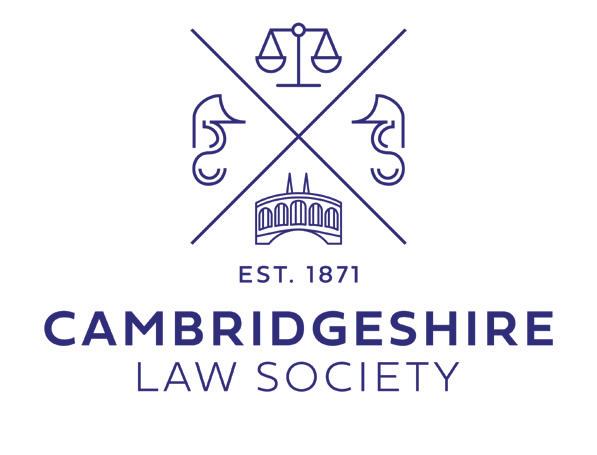









President
James Allen Birketts
Vice President
Fiona McLeman FM Family Law
Deputy Vice President
Joanna Cotgrove Ashtons Legal
Honorary Secretary
Anna Mortenson, Nichino Europe
Honorary Treasurer
Gary Hanson
Barristers Rep
Miriam Mallon Fenners Chambers
University and Community Partnerships Officer
John Wright Lawson West
Corporate Sponsorship Officer
Fiona McLeman FM Family Law
Council Member
Michael Frape Ashtons Legal
CSR & Pro Bono Officer
Alex Curnow Mills & Reeve
Equality, Diversity & Inclusion Officer
Scott Smith Thomson Webb & Corfield
In House Lawyers Rep
Guy Wheeler Cambridge University Press & Assessment
Junior Lawyers Division Representative
Ebony Flack Ward Gethin Archer
LEA Officer
Raina Victor Endomag
L&D Officer
Chris Hoole Appleyard Lees IP
Patent Attorneys Rep
Kealan Fallon Appleyard Lees IP
Peterborough Reps
Mateusz Pysera & Nicolle Trust Greenwoods
PR & Social Media Officer
Josie Beal Birketts
Publications Editor
Kate Harris Birketts
Social Events Officer
Jonathan Dattani Ashtons Legal
Sole Practitioners and Small Firms Rep
Sophie Scotcher Myers Law
Administrator
Penelope Harrington
MEETINGS 2025
Tuesday 4 November
Committee Meeting On Zoom 5.30pm
EVENTS 2025
Wednesday 1 October
Class of 2025 Celebratory Drinks
The Town and Gown, Cambridge, 5.30pm – 7.30pm
Tuesday 14 October
Diversity Network Webinar - Social Mobility in the Legal Profession On Zoom 12.30-1.30pm
Thursday 20 November
Ten Pin Bowling Evening
Ten Pin, Cambridge Leisure, Cambridge 6.00pm – 8.00pm
Wednesday 10 December
Festive Networking Drinks
The Clayton Hotel, Cambridge 5.30pm – 7.30pm
Friday 17 April 2026
Legal Excellence Awards 2026
Queens’ College, Cambridge CB3 9ET, 6.00pm – 1.00am


AsJames Allen President, Partner, Head of Cambridge Corporate Team, Birketts LLP
President of the Cambridgeshire Law Society, I am often asked what leadership in our profession truly looks like. Too often, the conversation is focused on the early years of practice and how we recruit, train, and retain newly qualified solicitors or, at the other end of the spectrum, on succession planning for partners and senior leaders. But there is a crucial group in between who deserve equal attention: our lawyers in the 8 -15 years qualified bracket.
These colleagues are frequently the backbone of our firms. They carry significant responsibility, combining technical excellence with the experience to guide clients through complex matters. Many are leading teams, supervising juniors, and quietly shaping firm culture day by day. They are often the ones who ensure continuity when leadership changes, and they provide the stability without which our profession cannot flourish.
Yet, this is also the point in a lawyer’s career where challenges can intensify. The initial excitement of qualification has passed, and partnership or senior leadership may still feel a distant or uncertain prospect. Workloads are heavy, and the competing demands of professional progression and personal life can create strain. Without recognition and support, even the most capable mid-term lawyers can feel overlooked or stuck in the so-called “career plateau.”
True leadership requires us to acknowledge this. We must do more than just celebrate achievements at the start and end of careers we must recognise, value, and actively support those in the middle. This might mean:
- Offering clear career pathways beyond partnership, including specialist leadership or client relationship roles.
- Investing in development opportunities such as leadership training, business development skills,
ARE HEAVY, AND THE COMPETING
or secondments to broaden horizons.
- Creating mentoring networks where mid-term lawyers can both receive guidance and act as mentors themselves.
- Championing flexible working arrangements that allow these lawyers to thrive professionally while balancing life commitments.
Supporting this group of lawyers is not only about fairness; it is about sustainability. These professionals are tomorrow’s leaders whether as future partners, general counsel, or senior in-house lawyers and they deserve investment now. If we neglect them, we risk losing vital expertise from our firms and from the wider legal community.
As a Society, we will continue to advocate for structures that nurture talent at every stage. Leadership is not just about titles; it is about creating environments where people feel valued, challenged, and supported. For these colleagues, that recognition is long overdue and it is time we placed them at the heart of the conversation about the future of our profession.
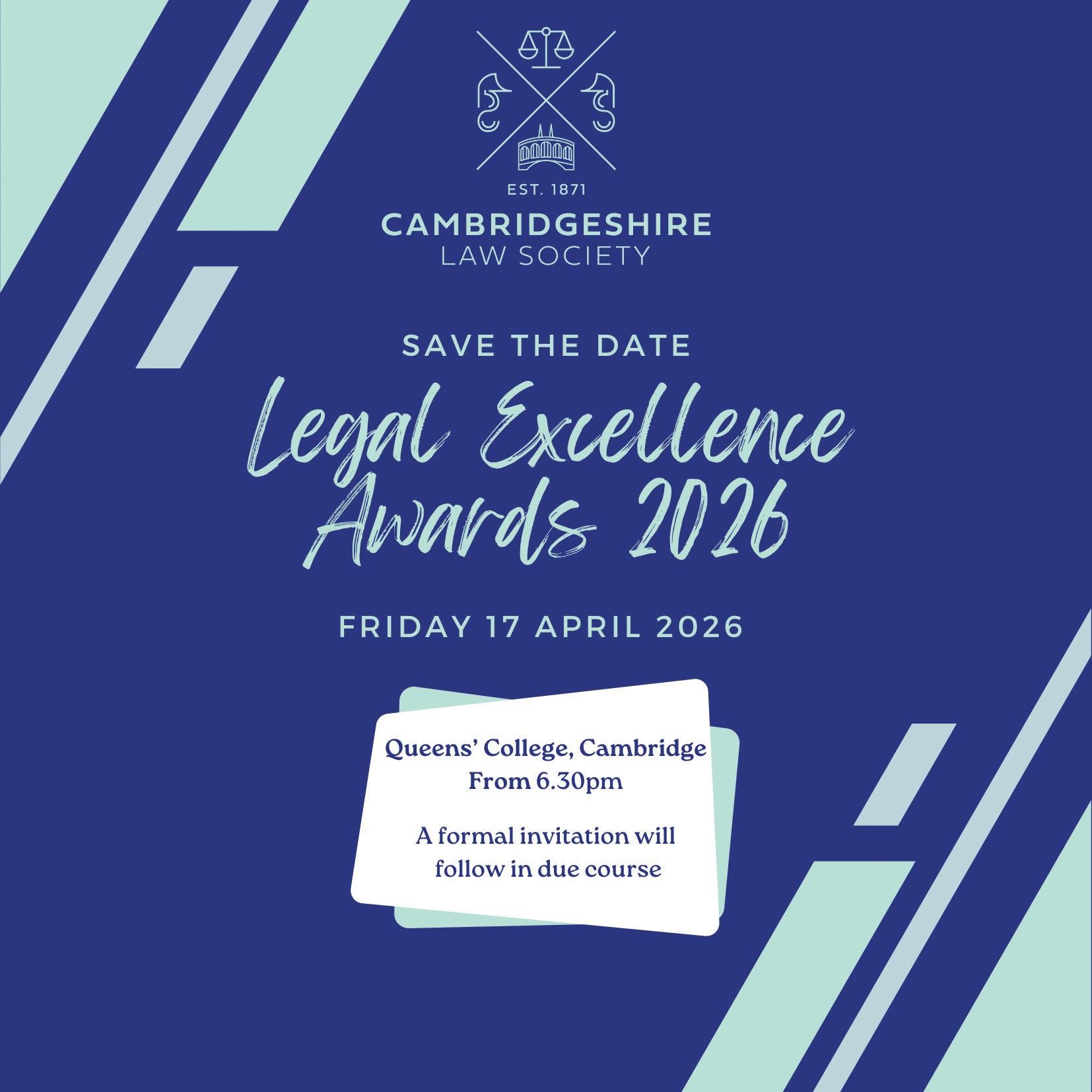

Michael Frape Law Society Council Member for Cambridgeshire and Peterborough, Chairman Ashtons Legal LLP
After the barbarism and destruction of the Second World War and the deaths of at least 70 million people, what is known as the “West” tried to put in place measures which would ensure that such a world-wide calamity would never happen again. For the first time people were given human rights under treaties such as the European Convention on Human Rights (1950). International treaties created a rulesbased international order and the new crimes of genocide and crimes against humanity were created to address criminality on a previously unheard of scale. The standard bearer of this new age of order was the United States. The Allies and especially the US as the oldest democracy and a republic (no king and no empire) stood for democracy and the rule of law. For the next 80 years, the US has portrayed itself as ‘the shining city on the hill’, a beacon of hope in a dangerous world and the bulwark of liberty, democracy and the rule of law.
Since his election, President Trump has shown scant regard for democratic norms or the rule of law. There are so many examples, one doesn’t know where to start, but pardoning all those convicted in respect of the attempted January 6th coup is a good start. Trump has disregarded many limits on Presidential power and by so doing many commentators believe that he is creating an authoritarian regime. Deploying the National Guard in the “blue” cities of Los Angeles and Washington DC was an autocratic show of force and had nothing to do with alleged crime waves. Trump had no legal power to impose tariffs when that is properly a matter within the remit of Congress. Trump has coerced media outlets, universities and major law firms by use of his executive power. It is a war on public scrutiny, academic
freedom and the rule of law. Seizing people on the streets and deporting them without due process is similar to the actions of the 1930s dictators, not a pluralist liberal democracy.
…THE COURT HELD THAT US PRESIDENTS HAVE ABSOLUTE IMMUNITY FOR ACTS COMMITTED AS PRESIDENT WITHIN THEIR CORE CONSTITUTIONAL REMIT… WOULD NIXON HAVE BEEN IMPEACHED IF SUCH A PRECEDENT HAD BEEN AVAILABLE?
There was an argument that Trump’s illegal acts would be overturned by the courts. Initially many courts ruled against the US government in the early months of the presidency, but the US Supreme Court seems to be ruling on appeals in accordance with the political leanings of the Justices. There is a clear 6-3 majority for Trump on the Supreme Court. Its jurisprudence supports Trump’s approach. A decision of the Court has effectively legalised ‘racial profiling’ of suspected illegal migrants. And in Trump v. United States 603 U.S. 593 (2024) the Court held that US Presidents have absolute immunity for acts committed as president within their core constitutional remit. This was a remarkable decision overturning decades of jurisprudence about the limits of presidential executive power.
Would Nixon have been impeached if such a precedent had been available?
Fascism is a form of authoritarianism which is difficult to define because it lacks an underlying principle. Socialism is based on a belief in equality. Liberalism is based on a belief in liberty. Fascism by contrast is not grounded in any identifiable ideal or theory. It is principally interested in seizing and accumulating power. Consequently, fascism is easier to recognise than define. If it walks like a duck and quacks like a duck…
Fascist regimes have various hallmarks including having a personality cult in the leader and being against scientific empiricism. The most chilling and egregious quality is however the identifying of groups of people as being enemies of the people. Fascism is easy to identify once you look for it. The ‘othering’ of identifiable groups of people is a clear fascist trait.
What is happening now in the US would have been unthinkable 12 months ago. Questioning whether the US will still be a true democracy operating under the rule of law in four years’ time is no longer a ridiculous notion.
What is happening there can happen here. The continuing rise of far right parties in Europe and the widespread disillusionment with the mainstream political parties points the way towards a less democratic future and an undermining of the rule of law. Democracy and the rule of law could turn out to be an admirable, but temporary blip in history. It would be regrettable to say the least, if that turned out to be the case. This darkening future should be a matter of concern for all solicitors.

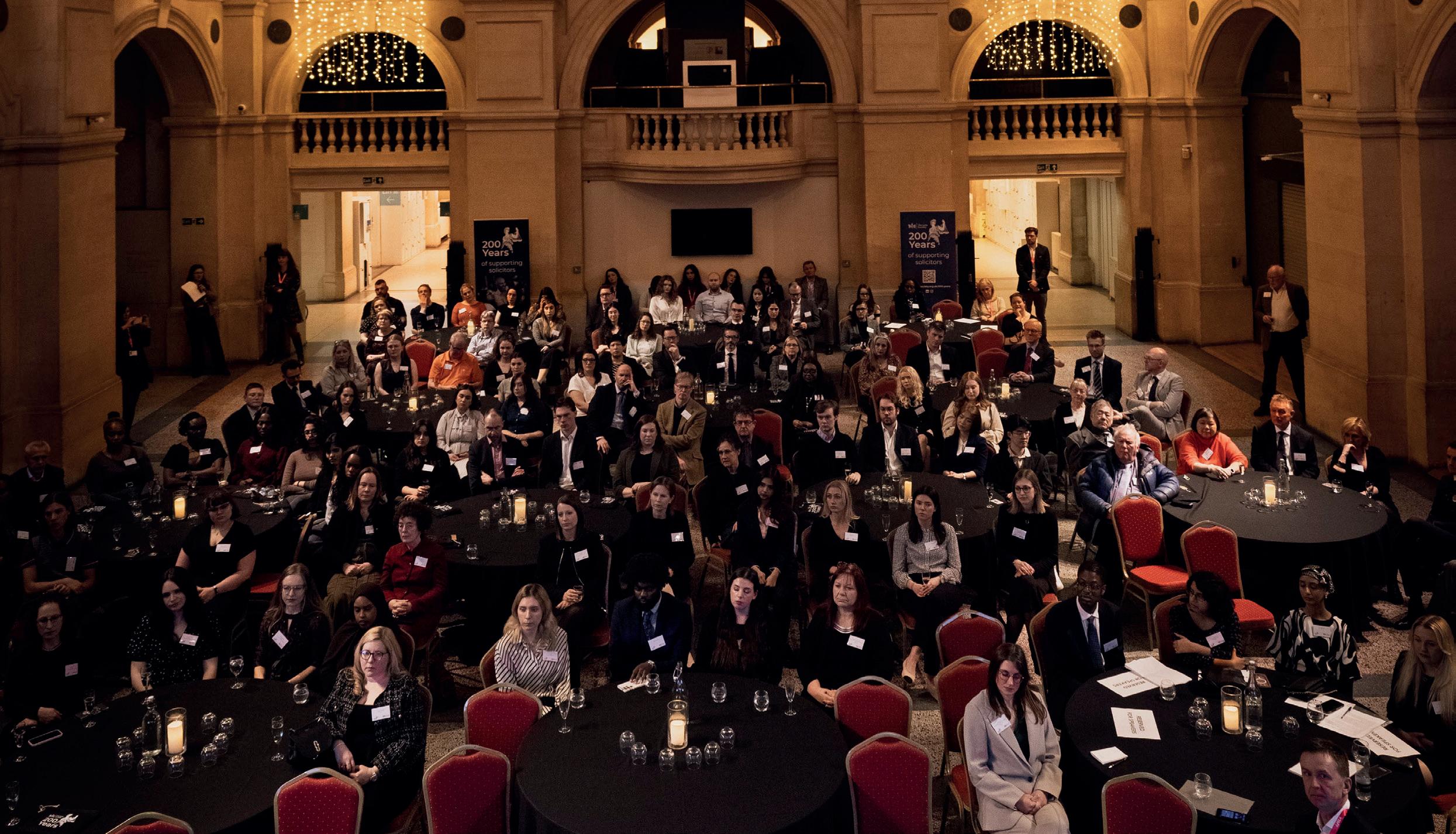

Beth Quinn Member Engagement Manager
If there’s one word that defines the bicentenary year, it’s connection. From bustling cities to coastal communities, the Law Society has been on the move – reaching out, listening to, learning from and celebrating with members across England and Wales.
Over the past several months, Law Society staff and office holders have visited 25 locations, participating in 46 engagements. These have included roundtables and seminars, networking and lunch events, panel discussions and university talks, networking receptions and evening celebrations and an admissions ceremony. Each stop on the tour has been an opportunity to reflect on the past, discuss the issues that matter most to our members at present, and discuss the future of the legal profession.
2025 has marked a historic milestone for the Law Society of England and Wales: two centuries of supporting solicitors and upholding the rule of law. To honour this remarkable legacy, and the vital role of our members, we launched a celebration filled with events, insights and meaningful engagement across England and Wales and beyond.
The regional tour has taken in a rich tapestry of towns and cities: Exeter, Truro, Falmouth, Plymouth and Bristol in the Southwest; Nottingham, Derby, Leicester and Birmingham in the Midlands; Leeds, Sheffield and York in Yorkshire; Newcastle in the Northeast; Cambridge, Ipswich and Norwich in the East; Manchester and Liverpool in the Northwest; and Cardiff and Llandudno in Wales. Alongside our London evening celebration, the programme concluded with visits to Brighton, Southampton, Bournemouth and the Isle of Wight in the South.
Whether working as independent advisors or within businesses, solicitors support their local communities to navigate difficult legal problems and identify solutions.
The variety of engagements held in each location have sparked vibrant
conversations about the profession’s future – touching on key themes such as economic growth, AI and legal tech, talent, access to justice and the rule of law, regulation, and equality, diversity and inclusion. From the high street to the high court, we will continue to support you with the issues that matter most, and champion the impact you make nationally and in your local communities.
Local law societies have played a pivotal role throughout the bicentenary tour. Their collaboration, insight and enthusiasm have helped shape events that truly resonate with local communities. Whether through panel discussions, receptions, or outreach initiatives, these partnerships have underscored the power of regional leadership and the importance of continued collaboration.

The celebrations haven’t stopped at the UK’s borders. The UK’s legal profession is a global powerhouse and a British success story – a true global brand that is recognised and respected the world over thanks to the stability and quality of our courts, our laws, and legal professionals in towns and cities across England and Wales. During the bicentenary, we have connected with our international members, hosting events in Singapore, Brussels, Hong Kong, Dubai and New York. These global engagements have highlighted the international strength of the solicitor profession and opened doors for continued cross-border collaboration, and we will keep pushing for more opportunities for our sector to reach its full global commercial potential.
Back home, the Law Society has released a snapshot report examining the current state of the legal profession, highlighting its role as a driver of economic growth and force for good. Engagement with policymakers has also been front and centre, with a parliamentary reception in March attended by the Lord Chancellor and
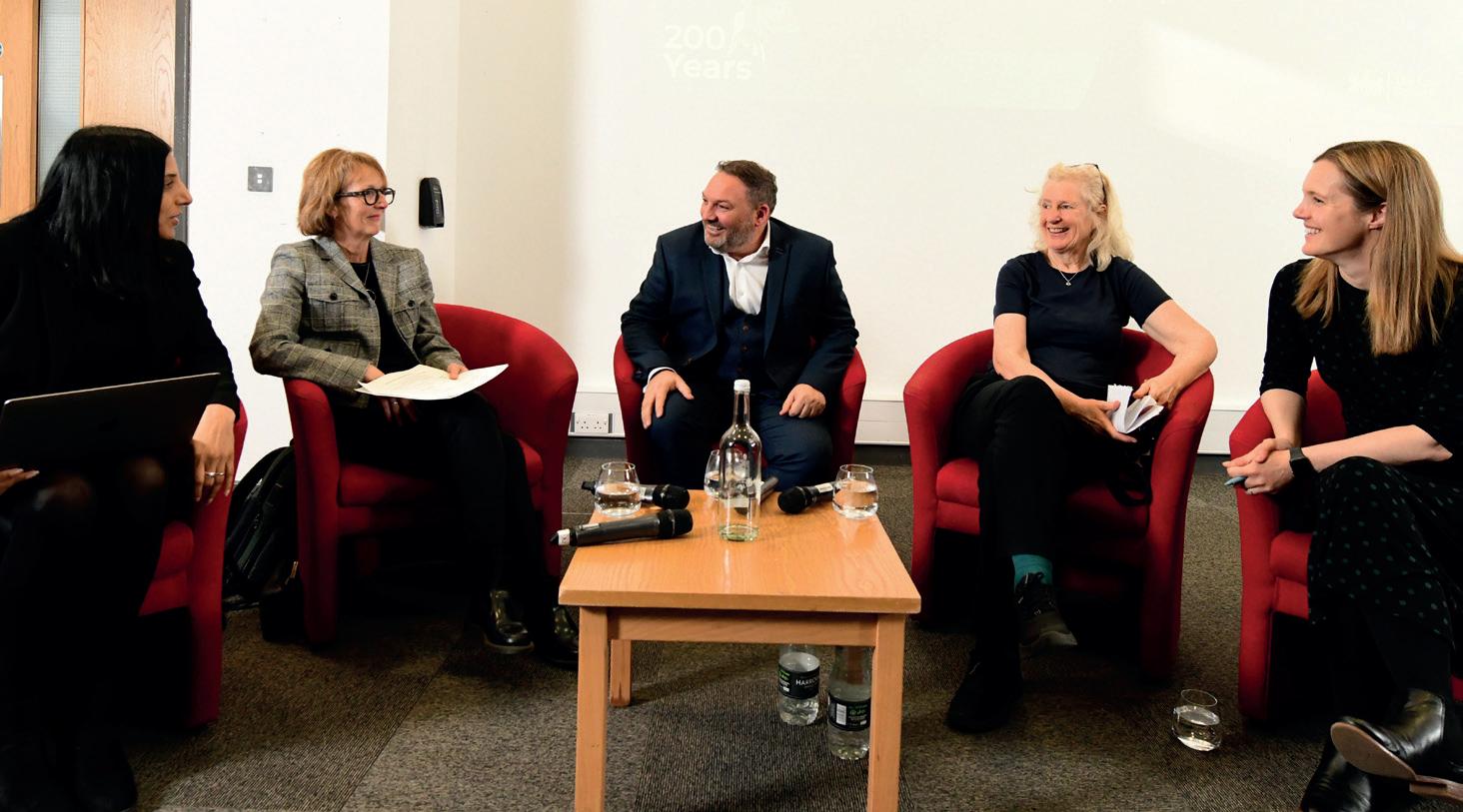
Secretary of State for Justice, and a London celebration in June which welcomed the Solicitor General as a keynote speaker.
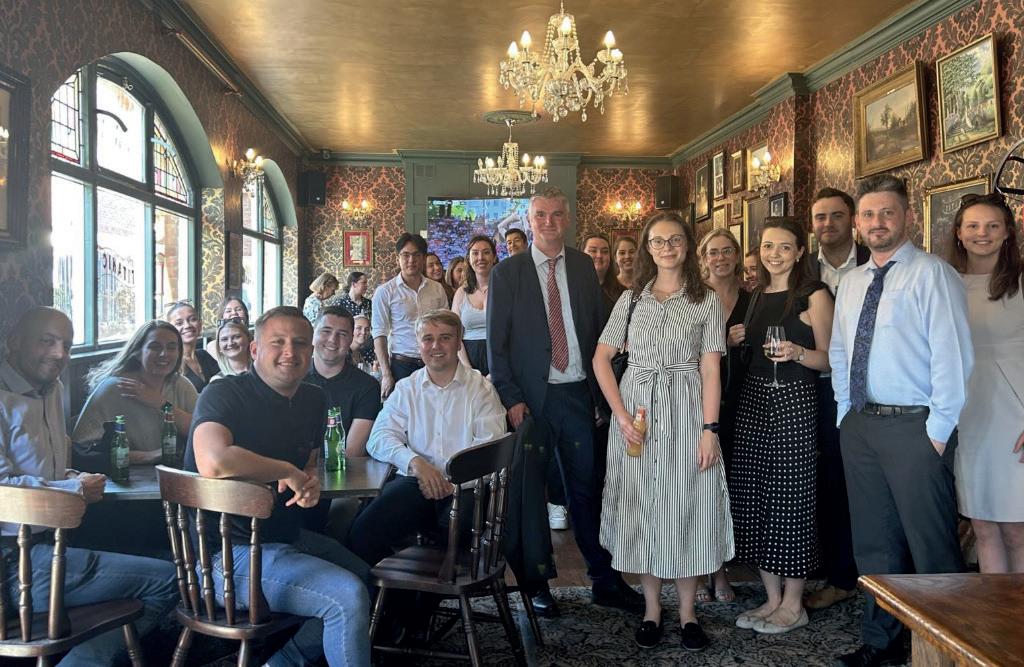
FROM BUSTLING CITIES TO COASTAL COMMUNITIES, THE LAW SOCIETY HAS BEEN ON THE MOVE – REACHING OUT, LISTENING TO, LEARNING FROM AND CELEBRATING WITH MEMBERS ACROSS ENGLAND AND WALES.
Though our regional tour has ended for this year, our bicentenary celebrations will continue through to the end of 2025. On Saturday 13 September, the Law Society will open its doors to the public as part of London’s Open House Festival, a chance to step into a rich and fascinating history and witness the architectural wonders of the Law Society’s Grade II* neoclassical building. Also on the horizon is a hybrid in-conversation event with renowned journalist Emily Maitlis, who will join a panel of experts to explore why the rule of law matters to us all. Those who haven’t been able to get an in-person place are still able to watch live online. We are also proud to be collaborating with renowned British artist and Turner Prize winner Helen Cammock on a landmark commission. Helen will create a powerful and original artwork that commemorates the Law Society’s 200th anniversary. This legacy will embody the values of the Law Society
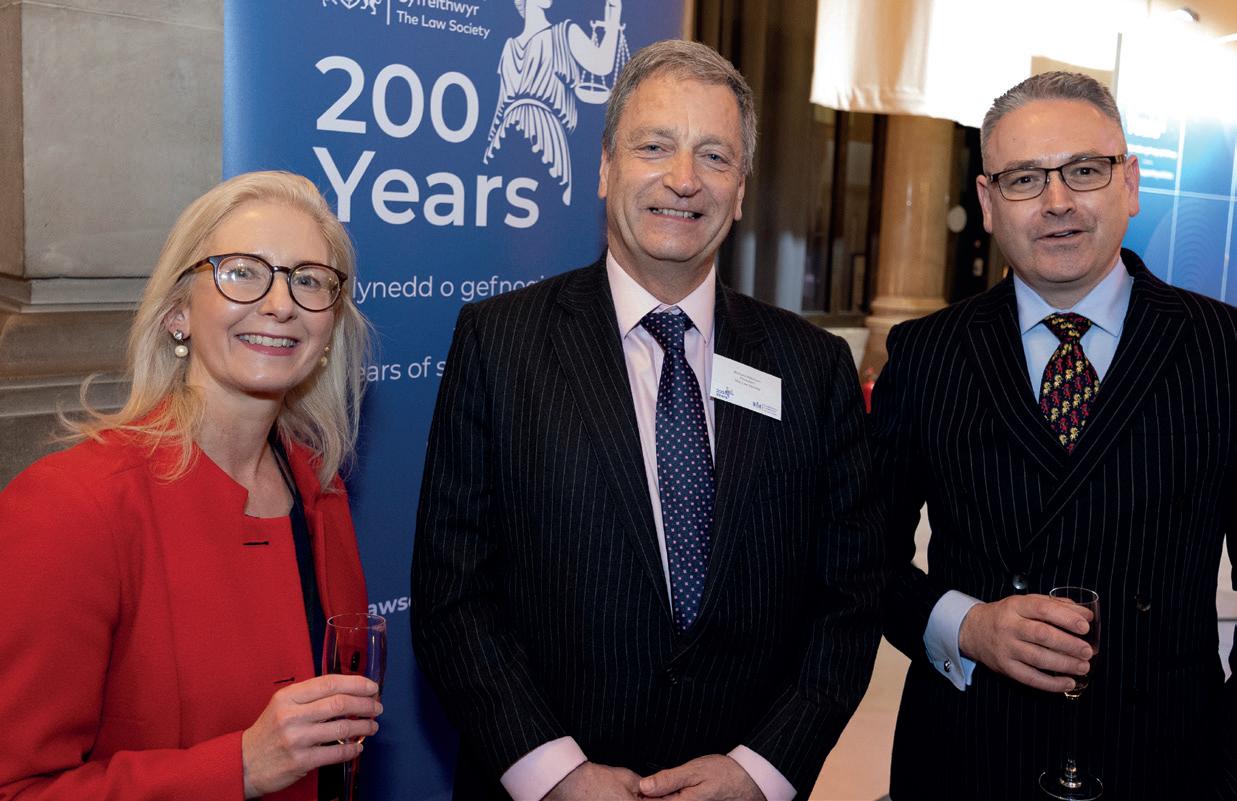
and highlight how the legal profession has evolved over the last two centuries. To stay updated, book events, or explore content please visit the Law Society’s bicentenary hub
While this year marks a significant milestone, it’s also a springboard for the future. The Law Society is committed to continuing its regional engagement into 2026 and beyond, with plans already forming for further visits across England and Wales. If your local law society would like to discuss a visit to your area in 2026, please contact beth.quinn@ lawsociety.org.uk


Scott Smith EDI Officer Senior Associate, Thomson Webb & Corfield LLP
Recent research by the London School of Economics found that you are 17 times more likely to become a lawyer if your parents are in the profession, with 60% of lawyers coming from higher socioeconomic backgrounds. So whilst firms are getting to grips with some aspects of equity, diversity and inclusion; social mobility remains one of the biggest (and often forgotten) barriers to the profession and succeeding in it.
As with many diversity metrics, it’s important to collect data – it’s how to work out your baseline, measure progress and compare to others. However, social mobility data can be hard to measure and difficult to categorise, so diversity surveys don’t always collect it, and even where they do, there’s much debate about the best metric to use. Should we look at the type of school you went to? The level of education you achieved? Perhaps the occupation of your parents? Is it about income, benefits or access to free school meals? Although there’s much debate, the reality is that any one measure is a good start and combining a couple of datapoints gives a very clear picture of socioeconomic status growing up.
Whether it’s leveraging family connections, links to good schools and universities, or less financial pressures when starting out in a career, growing up in a higher socioeconomic household is a fantastic head start
in life and in the law. Whilst this may not inherently be a bad thing, it does place others at a distinct disadvantage. Securing work experience without those connections can be more difficult, and accepting a sought after internship might have to be weighed against a paid summer job if parents can’t offer financial support. Even as junior lawyers develop their careers, it may take more time to build professional connections or adapt to the expectations and norms of a professional environment, which they may be experiencing for the first time.
Despite there being no evidence of a link between socioeconomic background and ability as a lawyer, those from lower socioeconomic backgrounds remain disproportionately underrepresented, and so it seems more needs to be done to level the playing field and ensure that all have the chance to succeed.
Whilst wider systemic changes to the education system and wider society are out of reach for many, there are things that firms can do to improve access for those who come from lower socioeconomic backgrounds. For example:
1. Encourage applications from those who might not meet standardised academic criteria, rather than insisting on a minimum degree qualification or qualifications from certain universities.
2. Partner with local colleges and universities to encourage applications from those who may not be able to afford to move away to study, or may not have the opportunity to apply to the most prestigious institutions.
3. Advertise for vacation schemes
and work experience and consider applications based on merit, not just those with links to the firm or its clients.
4. Pay vacation scheme and work experience participants for their time so applicants don’t have to choose between gaining useful experience and earning the income they need to support themselves and their families.
5. Consider offering positions for apprentice solicitors or advertise alternative routes to qualification, to allow those looking to qualify to work whilst they study – although any position should include sufficient study time alongside working hours.
This is just a starting point, but if you’re interested in learning more, why not join us for our panel discussion with local lawyers and Law Society social mobility ambassador Shama Gupta, as we delve into the detail of why social mobility matters and what we can do to improve access to the profession.

TUESDAY 14TH OCTOBER 2025 12.30 - 1.30PM
The event is free to attend and is open to members only. Log in details will be provided following registration. Register at: Events | Cambridgeshire Law Society

AlexHunt is the founder of the Cambridge Networking Running Club, a relaxed but purposeful initiative that brings together professionals from a range of industries for informal, accessible runs around the city.
"I started running when I was around 12 or 13,” Alex recalls. “I was never particularly good at sports involving coordination – anything with a bat or ball wasn’t for me. But I could run. And I was usually faster than my friends.”
While not a competitive athlete in the traditional sense, Alex did once take part in the national cross-country finals in 2004. “I fell over at the start line and finished 300th out of 300. Still, it’s my career highlight!”
For Alex, running has remained a consistent outlet. It is a means of maintaining fitness, clearing the mind, and stepping away from the pressures of a busy life.
The inspiration to combine running with professional networking came in late 2024, sparked by a LinkedIn post from Mark Evans, Vice President of the Law Society. Mark sought to promote running groups for legal professionals nationwide under the banner Legal Runner.
“I’d considered starting something similar in Cambridge, but hadn’t acted on it. Seeing Mark’s post gave me the nudge I needed.”
The first run took place in October 2024, with a turnout of 10 participants.
But the interest was clear – and the mailing list has now grown to nearly 40. “What’s encouraging is the variety of people who attend. It’s rarely the same group, and often, if someone can’t come, they’ll send a colleague in their place. It’s built a life of its own.”
Initially launched as Cambridge Legal Runner, the group has since been rebranded as the Cambridge Networking Running Club, reflecting its wider appeal.
“Cambridge has a vibrant professional community beyond the legal sector,” Alex explains. “By opening up the club, we’ve welcomed financial advisers, accountants, estate agents, land managers, and others. It’s truly open to any professional who enjoys running –regardless of pace or background.”
One of the first people approached with the idea was Emma Geale, a long-time running partner. “Emma has a real talent for building communities, and she was immediately enthusiastic. We scheduled a run and made it an open invite. We thought, if no one turns up, we’ll just run together. But the turnout exceeded our expectations.”
Though easy to organise, running with a group of mixed abilities does come with some logistical challenges. “Keeping everyone together isn’t always straightforward. We’ve had a few instances where people got separated or lost – though never for long. Emma is great at guiding the group.”
To improve this further, Alex is completing the Leadership in Running Fitness course with England Athletics this autumn.
Knowledge of the Area
Having lived in Cambridge for over 30 years, Alex is familiar with nearly every path and park in the city. “Route planning has become a way of showcasing the most pleasant parts of Cambridge. We’ve yet to repeat a route, and our next run is number ten.”
Even modern tools have found their way into the project. Alex shared how his use of AI to generate promotional graphics is rather playful, though he has ambitions to incorporate AI into future route planning.
Alex shared how running gives him time to think. “I often work through legal problems or ideas while running. There’s a discipline and consistency to both law and running that complement one another.”
It has also created new professional opportunities. “At a recent conference in Jersey, I ran with fellow lawyers, investment advisors, and trust managers. Running is a great opportunity for us to meet up and become closer.”
Advice for Busy Professionals
When asked what prevents more professionals from engaging in regular exercise, the answer is simple: time. “With demanding jobs, family responsibilities, and busy schedules, it’s easy to fall out of the habit.”
Alex’s advice: “Start small. Find an accountability partner. Don’t worry about pace as there will always be someone faster. Focus on building positive habits and enjoyment.
Alex hopes to enter a team for the Chariots of Fire relay next year and is exploring themed runs – including a potential festive “Santa Run.” There are also plans for a winter social to bring the group together.
“We’ll continue to grow steadily. The more, the merrier. It’s a relaxed space with no pressure, just professionals connecting through a shared enjoyment of running.”

Jonathan Dattani Social Events Officer Solicitor Ashtons Legal LLP
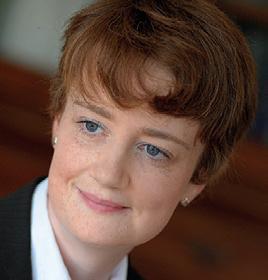
Sally Gore Barrister Fenners Chambers
As most people working in the field of SEND (Special Educational Needs and Disabilities) or SEND law know, the Government is due to publish a White Paper this Autumn containing its proposals for reform of the SEND system. The reason? Essentially, that it has been decided that it costs too much money. It also doesn’t really work.
Whilst no one really knows at this stage what will be in the White Paper, rumours have been circling now for several months. Anxiety amongst those who are likely to be directly affected by the changes is high. This has been fuelled by a 110page report published by the thinktank Policy Exchange: Out of Control –Addressing the Rise in Psychiatric and Neurodevelopmental Disorders amongst Children and Young People. The report has a Foreword by the Rt Hon Sir Jeremy Hunt MP which contains the following statement:
Mental ill-health and neurodiversity now accounts for more than half of the post-pandemic increase we have seen in claimants of disability benefit. Spending on SEND provision has sky-rocketed and risks the financial sustainability of Local Government.
Rather than assuming that more money or ‘more of the same’ is the answer, we need to ask more fundamental questions. Is a cash transfer – or a label that means young people are treated and come to see themselves as different –the right way to help them? What about the importance of good work, physical activity, social connection?
One frequently repeated suggestion over the summer has been that the new proposals will aim to drastically reduce the number of children with Education, Health and Care Plans (EHCPs); that schools will be expected to identify and then support the majority of children with additional needs themselves through their own budget, thus reducing the cost (and administrative burden) of EHCPs.
Any such changes would require significant changes to (and most likely repeal of) the relevant parts of the Children and Families Act 2014, as well as the SEND Code of Practice.
The System Now
Paragraph 6.1 of the SEND Code of Practice sets out the general expectation:
All children and young people are entitled to an appropriate education, one that is appropriate to their needs, promotes high standards and the fulfilment of potential. This should enable them to:
l achieve their best
l become confident individuals living fulfilling lives, and
l make a successful transition into adulthood, whether into employment, further or higher education or training
The Code goes on to repeat that this is a ‘best endeavours’ requirement.
Where a pupil is identified as having SEN, schools should take action to remove barriers to learning and put effective special educational provision in place.1 The goal should be to remove/ reduce barriers to learning and to put effective SEN Support in place.
SEN support is help that is additional to, or different from, the support given to most other children of the same age. The idea is to help the child in question to achieve the outcomes and learning goals identified for them as part of the process.
The Problem with SEN Support
If a parent feels that their child needs an EHCP, there is a clear legal process to follow: they can request a Needs Assessment which triggers a statutory timetable and the parents then have (some) legal recourse if this does not proceed as it should.
With SEN support, it is trickier. That clear legal process with its in-built protections and statutory safeguards is not really there. The legislation simply requires schools to ‘use their best endeavours’ to secure the special educational provision that is called for by the child’s needs.
The detail of the expectations around SEN Support is found in the Code of Practice and the difficulty is that the language of the Code sets out what ‘should’ happen, not what ‘must’ happen. It is statutory guidance but it does not impose a mandatory duty on schools to take particular steps.
This is problematic. It is unhelpful to schools because it is imprecise and, at times, unclear. It leaves a lot open to interpretation. It is unhelpful to parents because it makes it difficult to question or challenge what is happening.
The result of this can be that schools, already over-stretched and underresourced, are not ‘required’ to do certain things and if they are not required to do something, they will not spend scarce resources (whether money or staff-time) doing it. SEN Support can, as a result, be inadequate and barely fit for purpose.
Contrast this with all of the statutory protections that come into play if an application is made (by a parent, by the child’s school, or sometimes by the young person themself) for an Educational Health and Care Needs Assessment (the assessment required before a local council can grant an EHCP).

The needs assessment request triggers a statutory timetable of 20 weeks from the request being made to a final Plan being issued (if that is the outcome of the assessment). There are various deadlines within that 20-week period by which the various steps in the assessment need to be taken, including gathering evidence from professionals. For example, Regulation 10(1) SEND Regulations requires the Local Authority to notify the parent by not later than sixteen weeks after the EHCNA request of the decision whether or not to issue a Plan.2
Unlike SEN support, where schools are simply given guidance as to what they ‘should’ be doing, or expected to use their best endeavours, the EHCP process provides enforceable legal protections for parents (and children) if the local authority fails to comply with the legislative framework.
For example, a local authority is required to receive advice from an educational psychologist as part of the Needs Assessment process and one common difficulty at present is delays in the assessment process caused by a national shortage of educational psychologists. However, the list of exceptions that justify non-compliance with statutory deadlines is short and extremely limited and a lack of staffing / lack of resources generally is not
included in this list.3 A failure by a local authority to comply with the legislative timetable for this reason therefore gives parents a potential ground for a public law challenge.
Similarly, if an EHCP is issued, the local authority is legally responsible for ensuring that the provision set out in the Plan is made available in full. This duty is contained in Section 42, Children and Families Act 2014. The existence of the EHCP therefore gives rise to a legally enforceable right to the provision contained within it. This is a non-delegable duty and it is absolute. If it is not provided, there is no ‘best endeavours’ defence and no grace period.4 Even if the school has failed to implement the provision despite funding being made available by the local authority, the local authority remains in breach of Section 42 CFA as a result and, once all other potential remedies have been exhausted, it may be amenable to judicial review.
The current statutory framework, therefore, does provide some robust legal protections for children and families, despite the system being over-stretched and underfunded. It is far from perfect. Parents may not have the resources (emotional / practical / financial) or even the time or opportunity to access legal protections. For now, however, they are there.
We do not yet know exactly what is planned this Autumn. What would happen if Education, Health and Care Plans were available to fewer children? If the forthcoming changes remove the legal protections outlined above and place the responsibility for meeting the needs of more children with schools, it does not take a great deal of creativity to foresee that more children will be left unsupported or without adequate support. An EHCP provides a child with ringfenced funding. Without access to an EHCP, presumably support that is to be met entirely by schools will also have to be met from schools’ nonringfenced budgets. If parents have no legal recourse whatsoever, how will any responsible body be made to meet the needs of children? It is hard enough now, with the (albeit limited) statutory protections that do exist. Even with an EHCP, parents may find that their child’s (legally protected) provision is not in place and still needs to be negotiated and fought over. The legal protections currently in place need to be strengthened, not eroded.
1 SEND Code of Practice, para. 6.44.
2 The only exceptions to this requirement (i.e. those which might legally justify an extension of this timeframe) are the four circumstances detailed in Regulation 10(4)
3 Regulation 10(4), SEND Regulations 2014.
4 This was confirmed in the recent High Court decision of R (on the application of JSH) v Westmorland and Furness Council [2024] EWHC 3362 (Admin)

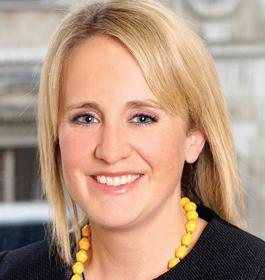
Kate Harris Editor, Partner Birketts LLP
Buckles appoints new head of Cambridge office
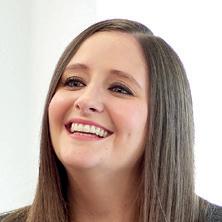
Sara-Rose Welch started her legal journey at Buckles in 2013 as a paralegal, qualifying as a Solicitor in Private Client in 2016 and being appointed as Head of Estate Planning in 2022.
In October, Rose will be taking on a new challenge overseeing Buckles Cambridge office and continuing to develop the firm’s offering to its clients in the region.
Greenwoods expands its Corporate & Commercial team

Tom Butler joins Greenwoods’ Cambridge office as a solicitor in their Corporate and Commercial Team, having qualified in January 2025.
Commenting on his appointment, Tom said: “I am delighted to be joining Greenwoods at such an exciting time. The firm’s growth, combined with the opportunity to work on high-quality cases, made my decision to join an easy one.”
Stephen Jarvis, Partner and Head of Corporate & Commercial, adds: “The Corporate & Commercial team continues to go from strength to strength, and we are all delighted to welcome Tom to the team. We have had a great start to the financial year, and their joining, combined with the recent promotion of Claire Banks to Partner, shows our commitment at Greenwoods to look after our clients’ growing corporate and commercial needs.”
Birketts welcomes new cohort of trainee solicitors for 2025
Birketts is delighted to welcome 29 new Trainee Solicitors this September, 4 of whom will be joining the Cambridge office; Katy Parker-Shorthouse, Rebecca
Here is a round-up of the latest moves, promotions and achievements of Cambridgeshire Law Society’s members…
Cook, Harry Wakeham and Jazmin Gyulai. Each trainee will gain handson experience across Birketts’ awardwinning sectors and services, supported by the firm’s multi-disciplinary approach and commitment to professional development.




Sonya O’Reilly, Partner, Head of Independent Schools and Birketts’ Training Principal, commented: “Birketts remains fully committed to nurturing future legal talent through our comprehensive training programme, and we’re thrilled to welcome such a talented and diverse group of trainees. We look forward to supporting them over the next two years as they develop their skills and contribute to the continued success of the firm.”

Joanna Baker joins HCR’s Cambridge office as a Partner in their Disputed Wills, Trusts and Estates Team. With a legal career spanning both in-house and private practice, Joanna’s work includes will validity claims, claims under the Inheritance (Provision for Family and Dependants) Act 1975 claims, rectification claims, breach of trust claims, trustee and executor disputes/ removal, Trust of Land and Appointment of Trustees Act 1996 disputes and proprietary estoppel claims
On joining the firm stated: “I am thrilled to be joining HCR and the private client team. From the outset of the interview process, it was clear how much care the team invests in every
client matter, and the legal expertise HCR Law has in its armoury to support clients right across the country, as well as internationally. I am looking forward to beginning this next chapter of my legal career and being a part of the Disputed Wills, Trusts and Estates team.”
Fenners Chambers welcomes new members
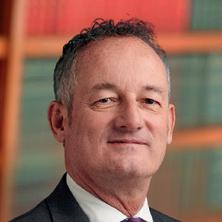
Fenners Chambers is delighted to welcome Dominic Barratt, formerly Head of Chambers at Cardinal Chambers with over 30 years’ experience as a specialist Family Barrister. Dominic deals with all areas of family law, including children matters, care proceedings, and complex financial disputes and is recognised in The Legal 500 for his clear, decisive approach and client-focused manner.
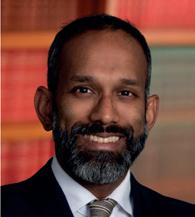
Fenners Chambers also welcomes Nathan Rasiah KC as a door tenant. Called in 2007 and taking silk in 2022, Nathan practises independently at 23ES, London, with a distinguished criminal law practice covering homicide, sexual offences, organised crime, terrorism, and corporate crime.
Recognised as “an exceptional advocate” and “fantastic on his feet,” Nathan’s recent cases include the successful prosecution of James Watson for the murder of Rikki Neave.
FM Family Law team expands

Olivia Adams joins the rapidly growing boutique family law firm as a Solicitor, specialising in all areas of private family law. Olivia’s appointment further strengthens the Cambridge team offering and is in line with the firm’s plans to grow whilst delivering the highest standard of family law services in the region.

Across the UK every year, lawyers, solicitors, barristers, legal executives, students, firms, chambers, and people in advice organisations volunteer their expertise and time to provide free legal help for those in need. Pro bono work can have a transformative effect on clients, truly changing lives.
As you know, many law firms run their own dedicated pro bono initiatives for their staff to get involved with. A range of charities and organisations provide advice and information about pro bono work, such as LawWorks, Advocate, Free Representation Unit and Pro Bono Connect. Here at Pro Bono Week UK, we’re really proud to partner with organisations like this, and so many of you, to make Pro Bono Week a reality every year.
As you may know, Pro Bono Week offers an opportunity to recognise and support the voluntary contribution made by the legal profession across the UK in giving free legal help to those in need. With less than two months to go, Pro Bono Week 2025 is happening from 3rd to 7th November 2025 - and we want you to be part of it!
It’s a fantastic opportunity to thank lawyers like you, highlight your pro bono impact, find new opportunities to take part, and encourage others to do so too.
Around 3,000 people took part in Pro Bono Week 2024, organising and attending 58 events, publishing reports or launching new initiatives. Almost 160 organisations posted on social media, and various stories were published in the press and on websites.
THE POWER OF PRO BONO LIES IN ITS PEOPLE. THAT STARTS WITH THE CLIENTS. THIS WEEK I HEARD FROM INDIVIDUALS, FROM THE SMALL BUSINESS OWNER WHO AVOIDED BANKRUPTCY TO THE WOMEN RECONNECTED WITH THEIR CHILDREN IN PRISON, ALL OF WHOM WERE REPRESENTED BY DEDICATED, TENACIOUS, PRO BONO LAWYERS.
the solicitor general, sarah sackman kc mp, talking about pro bono week 2024
Last year’s highlights include:
■ The Faculty of Advocates convened an event in Edinburgh to discuss the power of environmental law.
■ Public Interest Litigation Support celebrated its 15th anniversary and revealed the research findings that map out the local public interest litigation landscape in Northern Ireland.
■ The National Pro Bono Centre and Pro Bono Connect marked one year of Pro Bono Expert Support.
■ The launch of the new Pro Bono Costs Order branch of the Pro Bono Expert Support Scheme, delivered in partnership with the Access to Justice Foundation.
■ A collaborative event featuring young lawyers sharing their experiences and advice on pro bono work, with a keynote address from the Deputy President of the Supreme Court.
■ LawtechUK organised a series of workshops to bring together practitioners in the access-to-legal space to explore how technology can enhance work and help overcome challenges.
■ The launch of a new website for the Attorney General and regional pro bono committees, featuring information from across the sector about pro bono.
■ The Great Legal Bake took place nationally during Pro Bono Week, involving 100+ teams and raising over £25,000.
YOU’RE INVITED TO ORGANISE OR ATTEND AN EVENT, LAUNCH AN INITIATIVE OR SHARE ON SOCIAL MEDIA -
Types of events during Pro Bono Week 2024 included:
■ Launches and publications
■ The recruitment of more lawyers to do pro bono
■ Firms highlighting the pro bono organisations they work closely with
■ Specific regional or area of law focus
■ University-hosted events to encourage students to take part in pro bono.
More information can be found on the Event Planning page
Finally, I conclude by not simply encouraging you to get involved in Pro Bono Week but to thank you for volunteering on a pro bono basis - at a time when the need for help could not be greater.
Help us make Pro Bono Week 2025 even bigger and better than ever before – and there are lots of free resources to help you.
This year’s overall theme is Pro Bono in Action, within which there are three suggested sub-topics:
■ Pro bono: stories of impact – hear from the frontline about how pro bono lawyers transform lives and support charities to make a difference in our communities and abroad.
■ Pro bono: win-win for professional & business development –develop skills, experience and a professional network, and an asset in recruitment and retention.
■ Pro bono: getting involved – advice and practical steps about how to start making a difference through pro bono.
Plan an event or campaign during Pro Bono Week 2025: law firms, chambers, legal societies, charities, in-house lawyers, law schools and universities are encouraged to plan events both internal or external. It is also an opportunity to publish reports or launch new initiatives to an engaged pro bono audience.
Tell us your plans by emailing info@ probonoweek.org.uk for the opportunity to be featured in our exciting online events calendar!
If your event is public, we’ll help you attract as many attendees as possible by spreading the word on our social media.
Plan to post on social media or your website in Pro Bono Week: show your commitment to pro bono, or to thank your volunteers, or to showcase a particular pro bono lawyer or project. Follow us on Linkedin, Bluesky or on Twitter/X at @ProBonoWeekUK for updates and news. The official hashtags are #ProBonoWeek and #WeDoProBono
Find other events to attend by browsing our events calendar. We’ll be populating this over the coming weeks with events across the UK.
Spread the word online – check out our free communications toolkit with social media graphics, posters and more.
Get baking with the Great Legal Bake and raise money for local advice charities
THE LAW CLINIC
THURSDAY 6 NOVEMBER 2025

In commercial conveyancing, the margin for error is slim. Clients expect certainty, lenders demand accuracy, and one overlooked detail can jeopardise the deal. However, in practice, many solicitors still approach searches as a mere formality, a tick box, something to complete rather than something to analyse thoroughly. That mindset could be holding the profession back.
The truth is, data is only as powerful as the insight it provides. A drainage and water report isn’t just a bundle of technical facts; it’s a window into the risks and responsibilities that shape your client’s decision-making. If the information is patchy, outdated, or poorly understood, you’re effectively advising in the dark.
That’s why clarity is the most valuable commodity in today’s commercial property market. As transactions become more complex, from mixed-use developments to portfolios spread across regions, the need for complete, reliable, and expertly analysed data has never been greater. It’s not about having a report, it’s about trusting what’s inside it.
The CON29DW Commercial data has now been serving solicitors for 15 years. Its role has grown beyond providing drainage and water data: it has become an essential foundation for informed decisions. But the profession must challenge itself to use it to its full potential. That means asking not just “What’s in the report?” but “What does
this mean for my client?” and “How could this affect the transaction six months or six years down the line?”
This is where experience matters. At Geodesys, with nearly 30 years of experience in the industry, we’ve seen firsthand the consequences of incomplete insight: disputes, delays, and renegotiations. We’ve also seen how the right information, presented clearly and acted upon early, can transform outcomes. That’s why our reports are more than data dumps; they’re interpreted, quality-assured, and designed to give you confidence in every recommendation you make.
The challenge for conveyancers is simple: don’t settle for the minimum. In a world where clients judge you on speed and certainty, clarity isn’t optional; it’s your strongest asset. By unlocking the full picture, you not only protect your clients’ interests but also strengthen your role as a trusted adviser in every transaction.
If you’re ready for the full picture, head over to the Geodesys website to get in touch or call on 0800 085 8050. The team is here to answer any questions you may have.
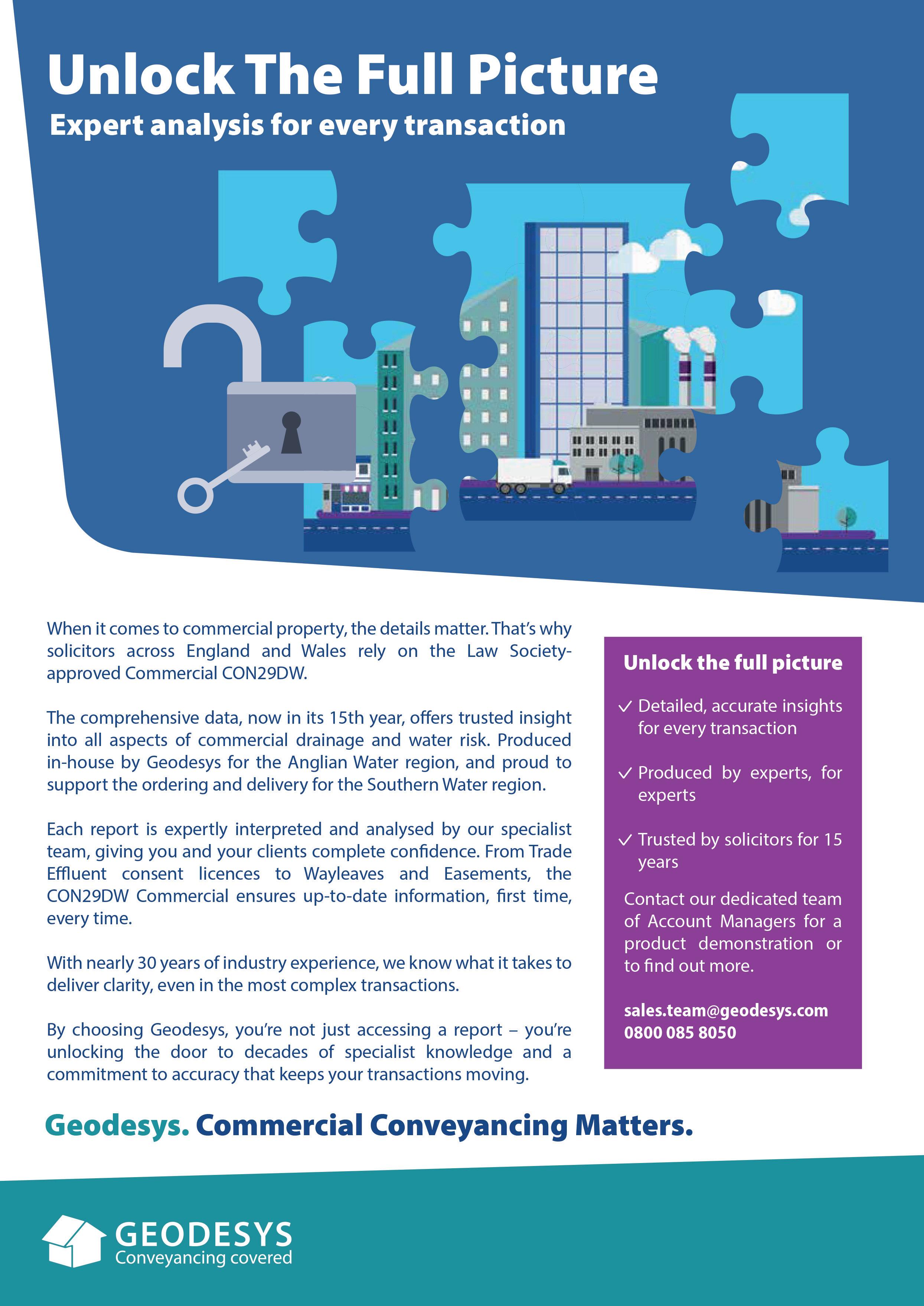

Ebony Flack Vice President of the CJLD Paralegal, Ward Gethin Archer Ltd
The CJLD took full advantage of the lovely weather this past summer! In June we went punting with Scudamore’s, followed by a picnic in Jesus Green to watch the May Ball fireworks which is a classic event for us. In July we took to Parker’s Piece with as much Domino’s pizza as could possibly be carried for our July Pizza in the Park event!
Autumn is a particularly exciting time for the CJLD. We would first like to offer a huge congratulations to those in the latest cohort to qualify! We ourselves have seen 3 members of our CJLD Committee qualify so far this year – with a special shout out to our President, Phoebe Fortune and two of our Social Secretaries, Megan Reckless and Gabriella Cox!
It is also our favourite time of year as this is when we host our most exciting events. At the time of writing, we have our August event approaching which will be the return of our ‘Slingers’
darts event at Smokeworks in Cambridge, which was a hit last year.
In September we have our most anticipated event of the year… The CJLD & CYPG
Annual Charity Ball!
We understand that ticket confirmations have started to go out and we are looking forward to seeing everyone in their finery for another bash at the Hilton to raise money for our chosen charities – Cambridge City Foodbank and Addenbrookes Charitable Trust! If you are able to donate a raffle prize please do get in touch with us.
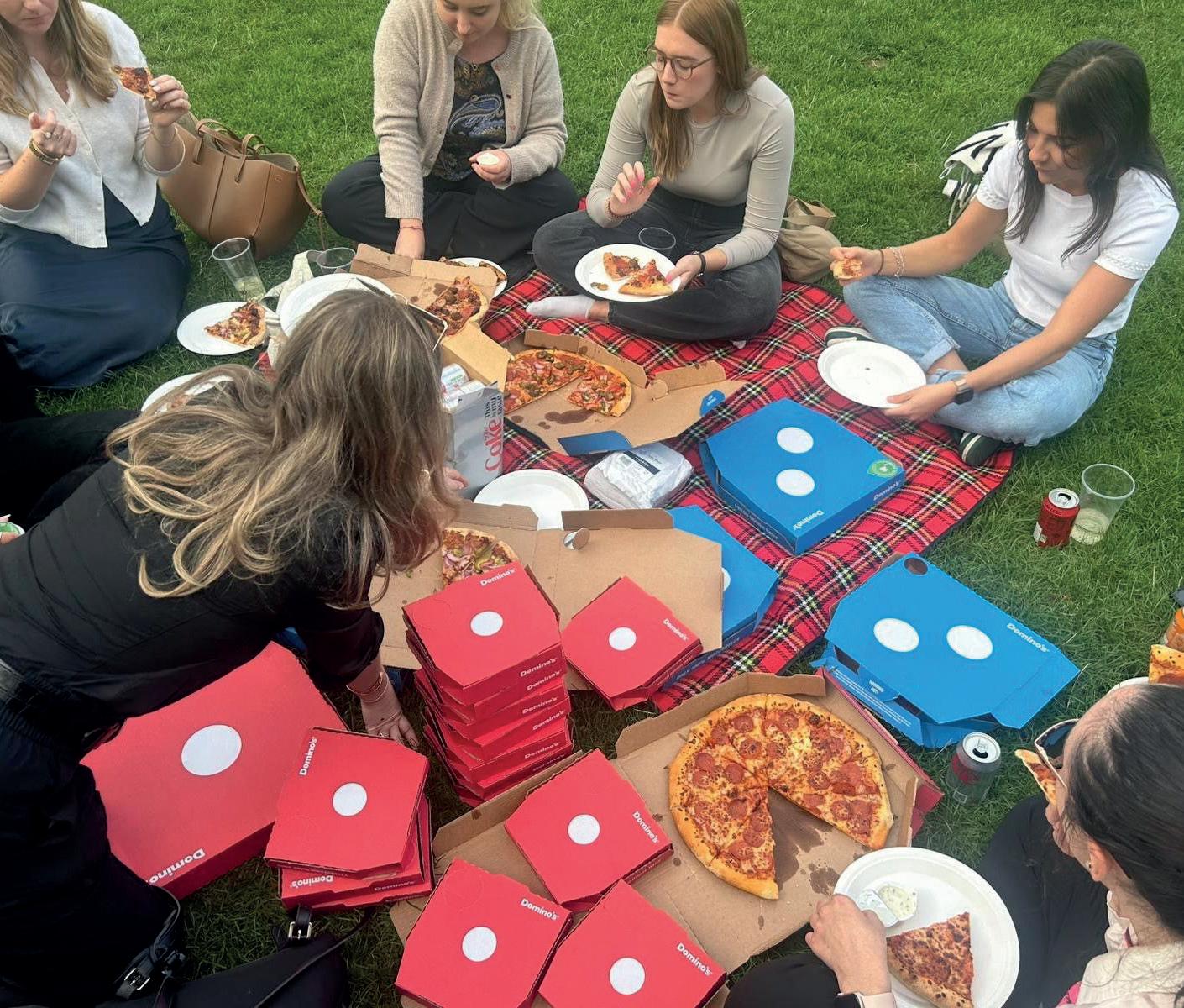
Keep an eye out for a save the date and further details on our mailing list and social media to book your place.
There will be details to follow on our events for the remainder of the year but we anticipate hosting another ghost walk in October, sushi making in November and have already began making arrangements for Glass Christmas Tree making in December!

If you would like to join our mailing list or become a member of the CJLD, please get in touch with us at cambsjld@gmail.com and follow our page on LinkedIn for all updates!
As always, a huge thank you to our sponsor Errington Legal Recruitment for their support of the CJLD!
Abigail Reynolds Associate, Chartered Legal Executive Mishcon de
Reya LLP
continues to bring the young professional community together with events that perfectly balance networking with genuine fun. On 21 August, we gathered at The Engineer's House (Calverley's amazing riverside venue) for an evening filled with laughter, beers, Scott's All Day pizzas and even some cheeky margaritas! The relaxed atmosphere allowed members to unwind after busy work schedules whilst forging new professional connections in true CYPG style. We could not have been more welcome, so a huge shout out to the Calverley's team!
Moving forward to September, we are thrilled to announce the annual CYPG and CJLD Charity Ball on Saturday 20 September 2025 at the Hilton Cambridge City Centre – and this year's casino theme promises an unforgettable evening of glamour and excitement.
Starting at 7pm, guests will enjoy a drinks reception, followed by a sumptuous three-course meal with wine, plus two additional drinks tokens. The entertainment lineup is impressive: a live band, DJ, photobooth, roulette
table, and raffle – ensuring there's never a dull moment as we all let our hair down together.
Beyond the festivities, we're proud to support two worthy causes: Addenbrookes Charitable Trust and Cambridge City Foodbank. It's a wonderful opportunity to give back whilst enjoying exceptional company and making a meaningful difference to our local community.
Roll the dice on an extraordinary evening – we can't wait to see you there!
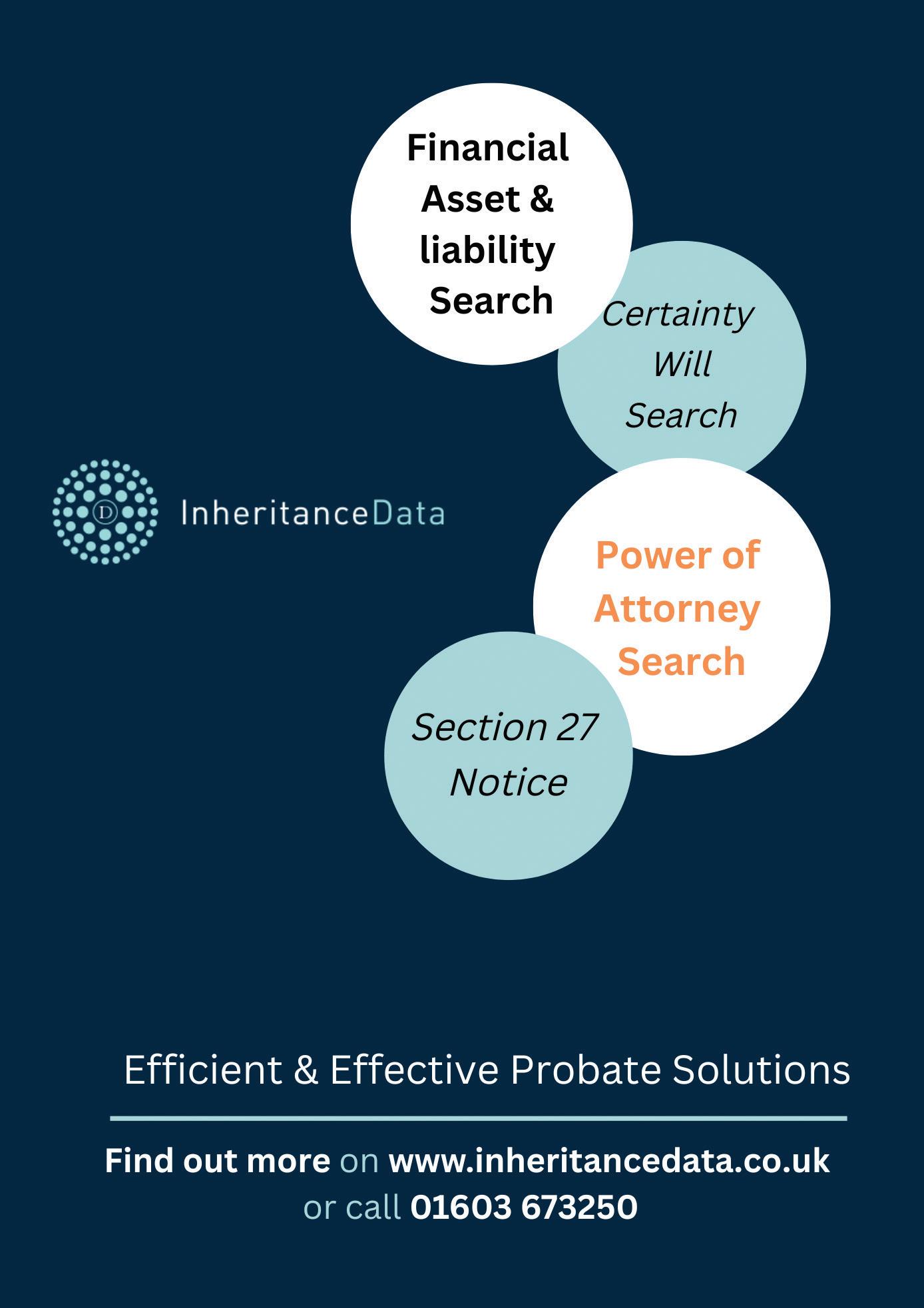


The judgement from The Honourable Mr Justice Trower in JSC Commercial Bank Privatbank v Igor Valeryevich Kolomoisky & Ors presents a number of interesting learning points for Expert Witnesses. But we have been particularly struck by the assertion that Expert Witnesses have a duty to disclose previous criticisms of their evidence in judgments.
“In two previous cases, Pindell Limited v. Airasia Berhad [2010] EWHC 2516 (Comm) and ACG Acquisition XX LLC v. Olympic Airlines [2012] EWHC 1070 (Comm), Mr S's evidence had not been accepted by judges of the Commercial Court.In the second of those cases, ACG (at para 50), Teare J had held that Mr S had not given sufficient consideration to his duty to the court not to omit matters which might detract from his stated opinion, having regard to some of the findings made by Tomlinson J in Pindell. The consequence of this in ACG was that Teare J was unable to rely on his evidence, save when accepted by the other expert.
These criticisms took on a further level of significance in light of the judgment in Peregrine Aviation v. Laudamotion [2023] EWHC 48 (Comm) at [22], in which it was noted by Henshaw J that "Mr S ought to have disclosed criticisms of his evidence in two previous judgments as part of or in conjunction with his expert report in that case".Henshaw J's judgment was handed down on 17 January 2023 but, despite this timely reminder of his duties, it was only six months later, a mere three days before his crossexamination in these proceedings, that Mr Kolomoisky's solicitors disclosed to the Bank's solicitors what had been said. In cross-examination, Mr S said that he thought he had forwarded what had been said in Peregrine to the lawyers at an earlier stage.I have no means of knowing whether he did in fact do so, but I consider that he should have ensured that this information was made available to the Bank and the court much earlier than he did.In that respect he was in breach of his own personal duty to the court. This failing made an evaluation of the credibility of his evidence a more
difficult task than would otherwise have been the case.”
Most experts will tell you that they are frequently unaware of the outcome of cases, let alone being sent copies of judgments that they have been mentioned in. This problem pervades the justice system and even extends to the Family Courts where there is a specific requirement for the Instructing Party to “send to the expert a copy of the court’s final order, any transcript or written record of the court’s decision, and its reasons for reaching its decision, within 10 business days from the date when the party received the order and any such transcript or record.” (Family Procedure Rules Part 25.19)
The Criminal Courts are at least a little kinder.The Criminal Procedure Rules r 19.2(3) refer to the expert’s duty to "disclose to the party for whom the expert’s evidence is commissioned anything of which the expert is aware."
But it seems somewhat unfair to say that Expert Witnesses have a duty to share this criticism since this is infrequently shared with them.
Of course, if you are aware of any criticism you would be wise to make your Instructing Party aware of it. The last thing you want is for your credibility to be attacked by opposing counsel who have researched previous cases in which you have been mentioned.
Just because you were criticised before, it doesn’t mean that you cannot redeem yourself. In considering another expert’s evidence, the judge wrote:
“In a judgment I gave in unrelated litigation (Bank St Petersburg OJSC v. Arkhangelsky [2022] EWHC 2499 (Ch) at [472]), I had criticised the quality of Mr Thomas' evidence as betraying a marked failure to recognise that his role was to assist the court by an independent and dispassionate statement of his views without descending into the arena to argue the counterclaimants' case on their behalf. Not surprisingly, he was taxed with this in cross-examination and accepted that the criticisms I had made of his evidence in that case were fair.However, his evidence in these proceedings was in marked contrast to his evidence in the Bank St Petersburg case.While he was firm in the views that he expressed, he did not cross the line into advocacy and explained the concepts on which he relied with clarity.He was confident in his opinions, and justifiably so.My overall impression was not just that he knew what he was talking about, but also that he addressed the issues with which he had been asked to deal in a fair and balanced manner.”
So the key learning points are:
l Do ask your Instructing Party for feedback and to send you a copy of any judgment, particularly if you gave evidence in a court/tribunal.
l If you are aware of any previous criticism, you should declare this to any Instructing Party.
l If you have been the subject of criticism, take the time to reflect on the criticism and consider how you might amend your practice. Undertake further training where necessary.


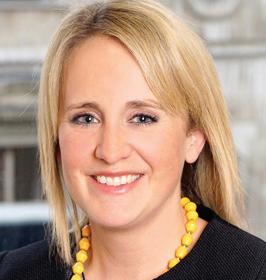
Kate Harris Editor, Partner Birketts LLP
Sowing success! Greenwoods advises Flora-tec Ltd through strategic sale Greenwoods were delighted to announce the successful completion of the sale of Flora-tec Ltd’s (Flora-tec) entire issued share capital to Outco Bidco Limited (Outco Bidco) on 6 June 2025.
Francesca Jus-Burke, Claire Banks, Stephen Jarvis, Nicolle Trust and Isobel Ryan-Dalton provided corporate & commercial expertise on the transaction, along with input from the firm’s Employment, Tax and Real Estate teams, which marked a significant milestone for Flora-tec, a leading UK horticultural services company based in Cambridge.
Andy Bradley, CEO of Flora-tec, said: “Great result from all the




We are continuing to celebrate the successes of our member firms and to bring you news of the biggest deals and wins from across the County. Here’s what’s been going on this quarter…
Greenwoods team working to a very tight deadline to get the deal completed by 6 June. Their advice and insight relating to mergers and acquisitions were invaluable. Thank you all.”
Francesca Jus-Burke, Managing Associate at Greenwoods, said: “Our team worked diligently to get this deal over the line in a short time frame. We are confident that this transaction will pave the way for future growth and success for all involved.”
Mills & Reeve advises on $18m biotech deal for 2023 Earthshot Prize Finalist Mills & Reeve have advised on an $18m Series B2 funding round for biotech firm, Colorifix, to help commercialise its sustainable dyeing technology which eliminates the use of traditional petrochemicals. Colorifix’s technology replaces the traditional need for petrochemicals in dye manufacturing with a biological process - fermentation - enabling significant reductions in environmental impact, requiring no
harsh chemicals and significantly less water and energy.
Linn Clabburn from Innovation Ventures at Inter IKEA Group, said: “Colorifix is addressing one of the toughest sustainability challenges in textiles.”
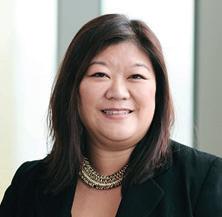
Zickie Lim, partner and head of venture capital investment at Mills & Reeve, who led the team advising Inter IKEA Group, said: “It was absolutely fantastic to work with the Inter IKEA team in making this important investment into such an innovative, cutting-edge business that has the potential to transform the global fashion and textiles industry to enable it to operate in a more sustainable and environmentally friendly way in the drive to help protect our planet. Colorifix’s technology has huge potential and armed with this latest funding, the company has an excellent platform to achieve its international expansion plans.”


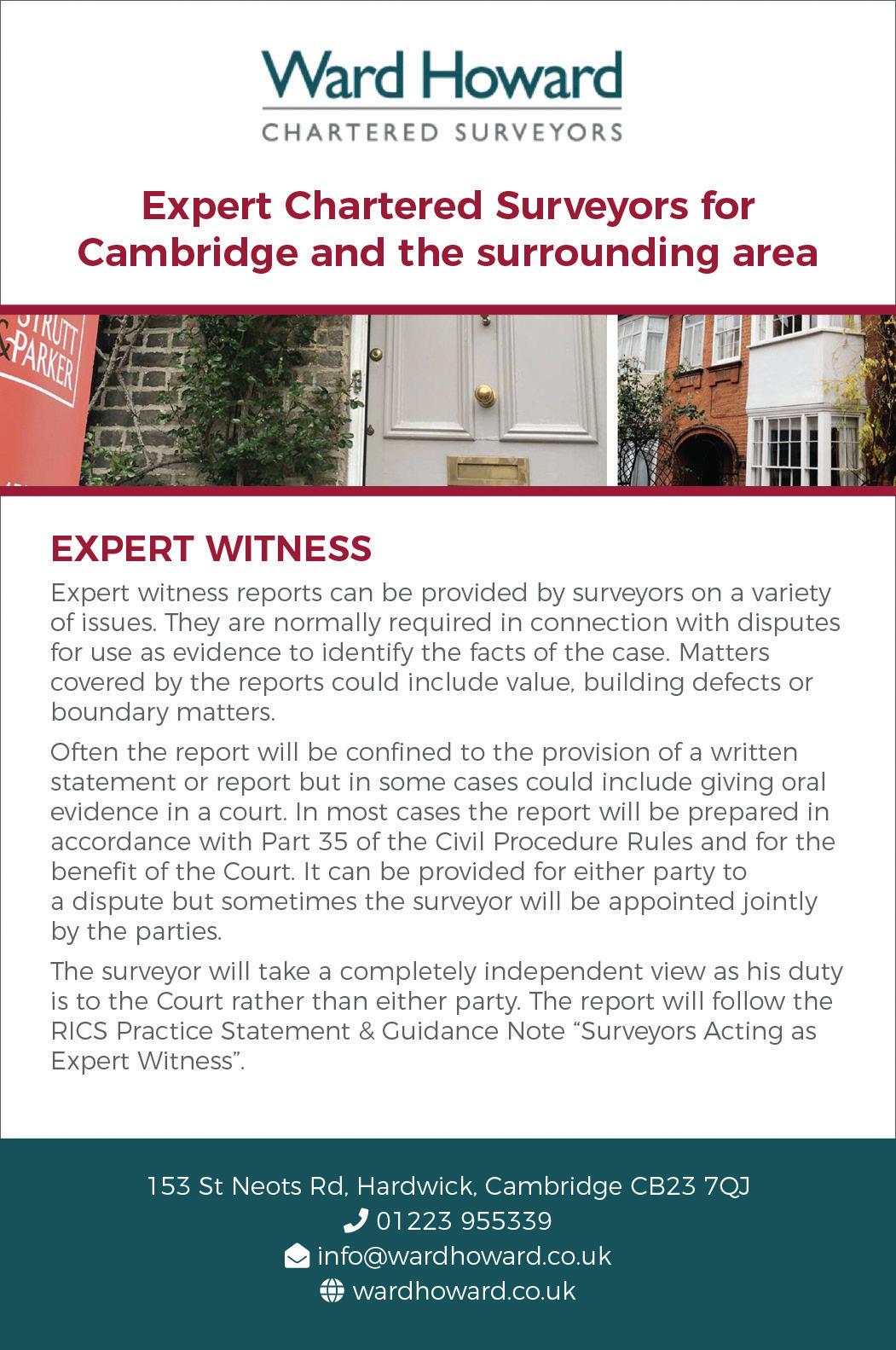
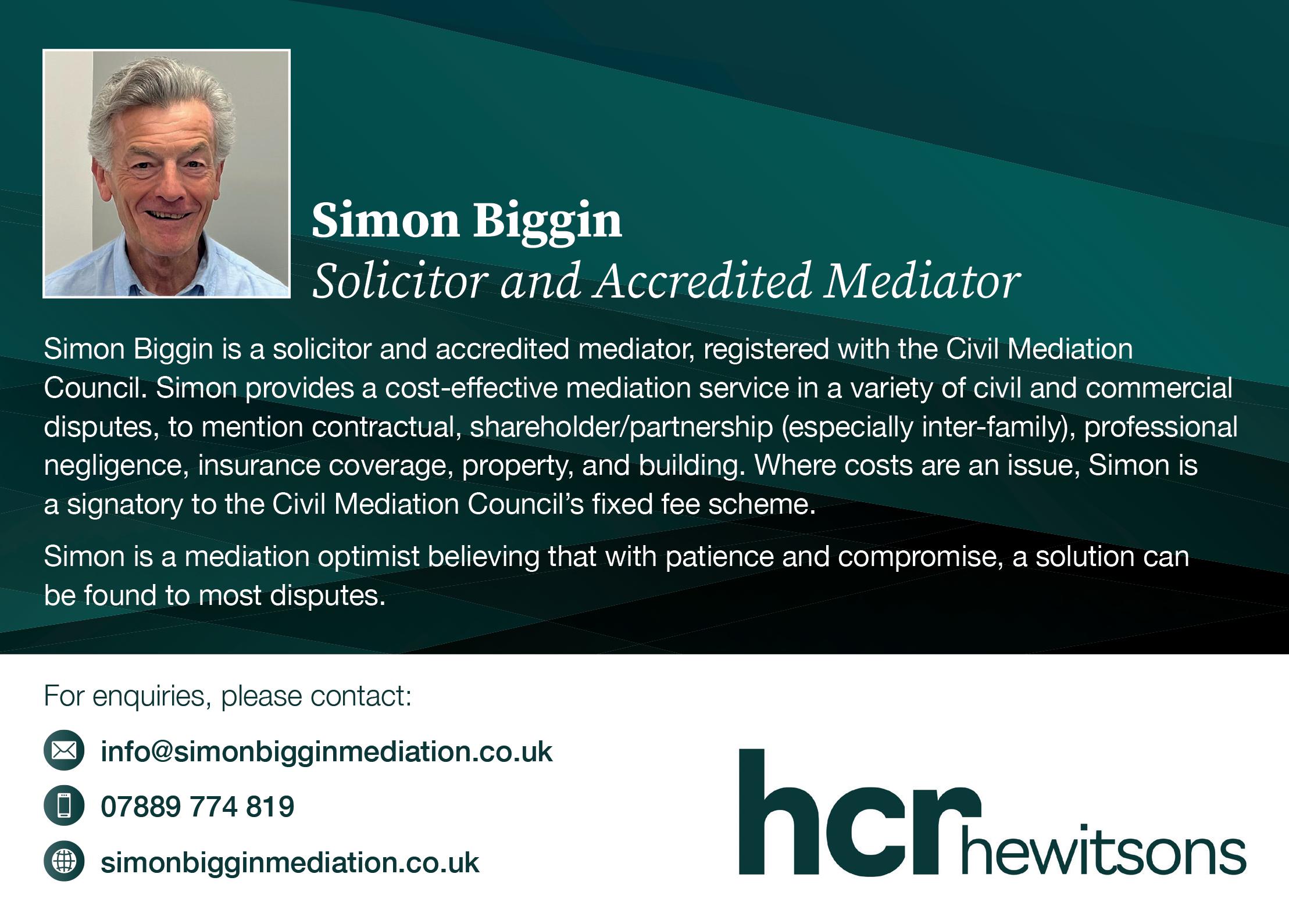
review by Phillip Taylor MBE, Richmond
Alegalhighlight each year for those involved in expert evidence is to visit the EWI’s Online Conference It is well established as a virtual event working to update us on the work of experts with panel discussions including, this year, ADR. The Conference was again excellently chaired by Kitty St Aubyn with panel chairs.
The event was no different to previous occasions and highly informative! The webinar brings together expert witnesses, solicitors, barristers and eminent judges, including, this year, Lady Rose and Birss LJ. Discussions reviewed key issues facing our expert community, giving legal updates, and delivering “an enlightening day of insight, advice and discussion”. And all online, too, from the comfort of your home or office.
The day’s highlight was the leading keynote address from a Supreme Court Justice, Lady Rose of Colmworth. In her recorded address, Rose reflected on the vital role of the expert witnesses across all aspects of modern litigation and dispute resolution.
Drawing on memorable cases from her time in the Chancery Division and on the Competition Appeal Tribunal, Rose highlighted the powerful impact that expert evidence can have on the outcome of a case. She cited two trends shaping expert testimony involving the nature of an experts’ work for the future.
The first trend identified the growing importance of “collective actions”, where a representative brings a claim on behalf of many individuals. These are sometimes known as “class actions”, being “the presentation of individualised evidence from numerous claimants” which can often be impractical as sole proceedings.
“Such cases”, Rose said, “increasingly rely on expert witnesses to provide an aggregate analysis”.
To avoid expert analyses duplication, Rose discussed use of ‘hot tubbing’ - always a favourite issue with the conference in recent years because of the imagery of the title! It’s a process where experts collaboratively present and discuss findings before the judge early in the process. It’s also an approach that does narrow the issues, promoting collaboration between experts, and it saves time.
The second trend covered the increased technical nature of expert evidence. “Such evidence is becoming more technical”, she said, observing that “it makes it harder to communicate clearly to barristers and judges, who must in turn explain the evidence in their judgments”.
To help experts navigate these challenges, four points emerged:
Remember that your duty is to the court and not to the party instructing you. Rose stated that “it’s the judge’s trust and respect that ultimately will prove the most important factor in your evidence being accepted by the court.”
Be clear and precise. “Quantity does not guarantee the quality”, Rose explained. “Sometimes the sheer weight of analysis obscures the royal the real point of issue.”
Do not underestimate the tribunal’s expertise. Rose made this observation: “You may find that your most searching questions come not from opposing counsel, but from the bench.” Too true!
Judges don’t want to trip you up or catch you out. Rose explained here that “We want you to help us understand what for many will be on familiar
territory, and if you do that with honesty and clarity, you will find yourselves indispensable to the process.”
Colin Birss is a judge of the Court of Appeal, Deputy Head of Civil Justice, and an advisory editor to “Civil Procedure: The White Book 2025”. A selfconfessed “computer wonk”, Birss offered a most useful picture of current issues in civil justice as the most experienced judge in both IP and IT matters today. We were very lucky to hear from him.
Conference aims for 2025 were to assist new experts looking to develop their understanding of key issues; experienced experts looking to develop their practice; and those who work with or instruct experts, so there was much variety again this year.
Expert witnesses come under continual scrutiny in the courts, so the conference provided essential insight and practical advice to help experts further develop their knowledge and skills, obtain instructions, and win repeat business.
Hearing from the senior judiciary, solicitors, and experienced experts, participants could reflect on important legal updates and ethical issues when considering what instructing parties are looking for. As usual, latest case law decisions introduced by Sean Mosby were particularly helpful.
There was a useful participation in a range of practical interactive sessions and discussions which are easy to use once one gets the hang of it in the virtual environment. For those who missed any sessions, recordings from the Conference are available, so thank you again, EWI, for a most successful virtual day. See you next year.
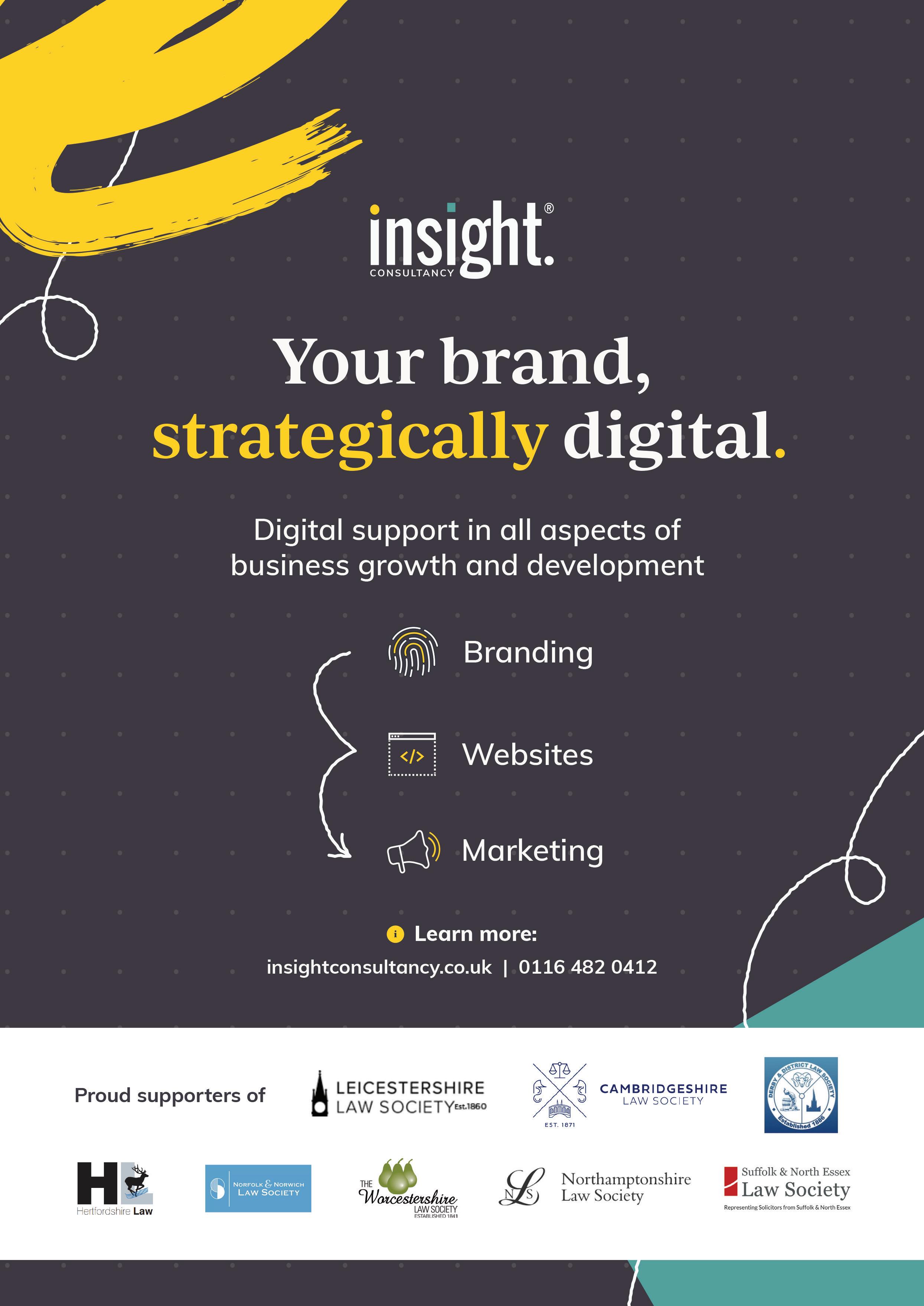
A new free training series for private client advisers - the Legacy Academy - launches today, coinciding with this year’s Remember A Charity Week (08-14 September 2025).
Developed by Remember A Charity and CPD training provider For Legal, the four-part webinar series is designed to equip advisers with the insight and confidence to have valuesled discussions with high net worth clients about charitable legacies. The on-demand training series is available on a complimentary basis through both For Legal and Remember A Charity’s website. It compliments existing training webinars for solicitors and Will-writers, also available through For Legal.
Legacy giving has become a vital income stream for UK charities, raising £4.5 billion in 2024 alone to fund crucial services from medical research to environmental campaigns. Although legacy giving has becoming increasingly popular at all levels of wealth, for high net worth individuals, it is even more prevalent. In fact, recent research* shows that half of people in the UK with over £1 million in investable assets have already pledged a charitable gift in their Will, with Charitable Will Trusts and Donor Advised Funds also becoming more widespread for this audience.
The option of leaving a charitable legacy is particularly appealing in the UK due to the generous Inheritance Tax (IHT) incentives available. These include that gifts to charity are free of tax and that donations of 10% or more of the net value of the estate can reduce the IHT rate from 40% to 36%. Professional advisers play a key role in helping clients understand their charitable options, including how a charitable legacy can be incorporated in their estate alongside any gifts for their loved ones and how to maximise the tax incentives.
Remember A Charity – a consortium of 200 UK charities - works with a growing network of professional advisers, including solicitors, professional Willwriters, tax specialists and wealth advisers, to provide resources, information and training on charitable legacies.
Each September, Remember A Charity Week takes place, with advisers encouraged to use the platform to make clients aware of the option of including their favourite charities in their Wills, alongside their loved ones.
Lucinda
Frostick, Director of Remember
A Charity commented, “For advisers, it’s becoming increasingly important to be able to support clients in meeting their philanthropic needs and passion for good causes. And that’s particularly evident when it comes to planning a legacy, where family and charitable causes so often come together. However, discussing charitable legacies doesn’t always fall within an adviser’s comfort zone beyond the sphere of solicitors and Will-writers.

FOR ADVISERS, IT’S BECOMING INCREASINGLY IMPORTANT TO BE ABLE TO SUPPORT CLIENTS IN MEETING THEIR PHILANTHROPIC NEEDS AND PASSION FOR GOOD CAUSES.
LUCINDA FROSTICK
“This training programme aims to bridge that gap, equipping and empowering a broad range of advisers to have these conversations with clients, deepening those relationships and supporting the growth of philanthropy across the UK.”
Wayne Spencer, Director of For Media Group, said, "We’re delighted to have partnered with Remember A Charity to develop this unique training programme tailored specifically for private client advisers. We are seeing a growing appetite among professional advisers for guidance on how to introduce and navigate philanthropic conversations with clients, and this series helps meet that need. With a focus on legacy giving, it offers practical insights and inspirational content to support advisers in discussing charitable bequests with confidence and sensitivity."
The Legacy Academy training series consists of four sessions:
SESSION 1:
WHY AND HOW TO START A LEGACY GIVING CONVERSATION
SESSION 2:
TAX, STRUCTURES AND LEGACY GIVING
SESSION 3:
SUCCESSION PLANNING AND LEGACY GIVING
SESSION 4:
A PERSONAL REFLECTION ON LEGACY GIVING: A CLIENT'S PERSPECTIVE
For more information or to register for the training series, click here.

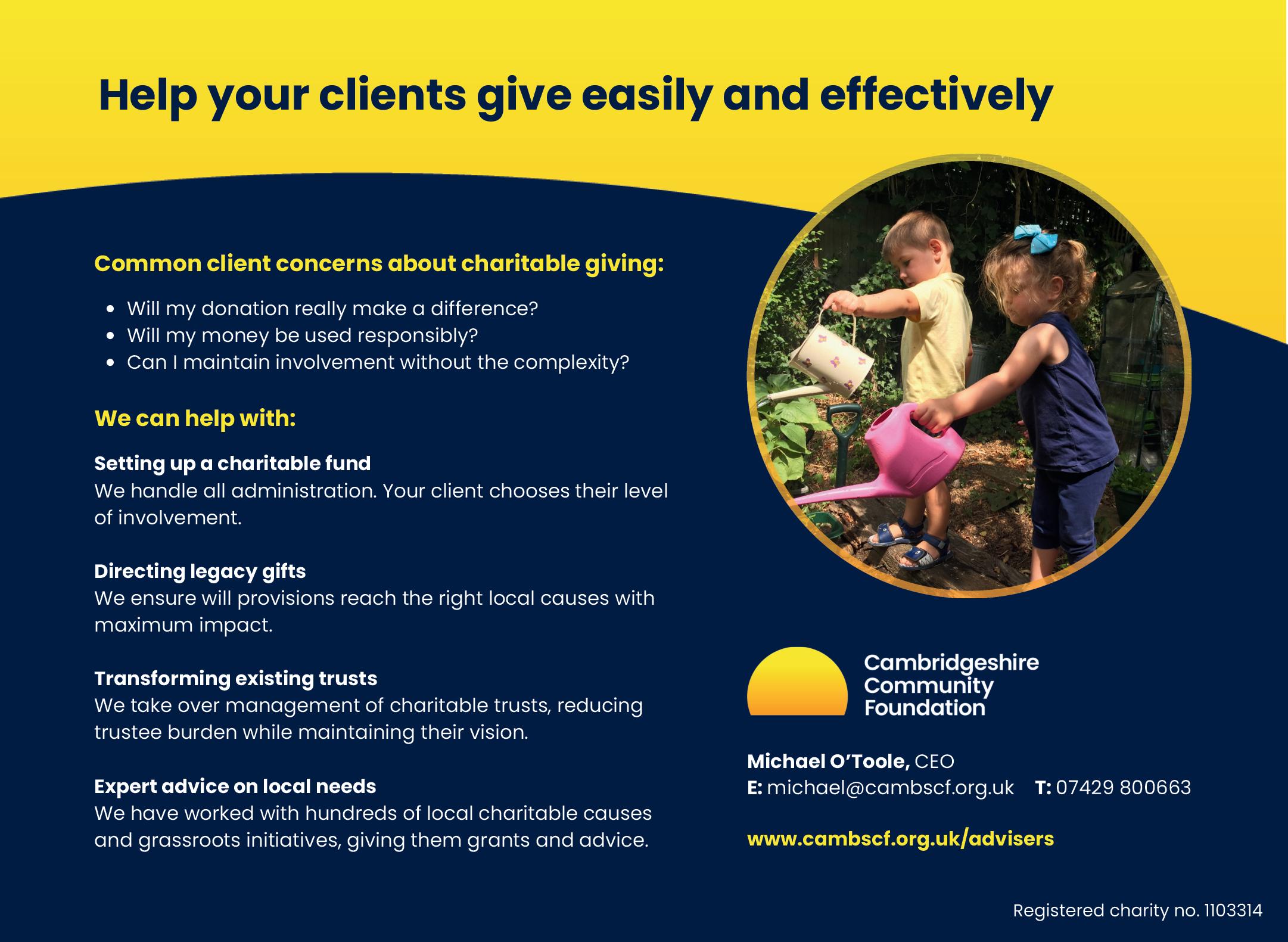

l 50% OF HIGH NET WORTH INDIVIDUALS HAVE INCLUDED A CHARITABLE GIFT IN THEIR WILL
l CHARITABLE WILL TRUSTS AND DONOR ADVISED FUNDS USED BY ONE IN THREE MILLIONAIRES
l LEGACY GIVING IS MORE PREVALENT AMONGST MILLIONAIRES WITH CHILDREN THAN THOSE WITHOUT; A CONTRAST TO MASS MARKET TRENDS
research from Remember A Charity, the UK's national legacy giving campaign, reveals the prevalence of charitable gifts in Wills amongst high net worth individuals (HNWIs), highlighting the opportunity for further growth.
The study, commissioned by Remember A Charity and conducted by independent research firm Savanta*, surveyed 500 people with over £1 million in investable assets. It reveals that half (50%) of millionaires have already included a charitable gift in their Will, rising to 75% for those with estates of £5 million+
Noting that legacy giving amongst high net worth individuals may extend beyond a simple donation in a Will, the research finds that nearly one third of the group (32%) have established a charitable Will Trust, and three in ten (28%) donated using a Donor Advised Fund (DAF).
There are generous tax incentives in the UK for those who leave a charitable gift from their estate. Donations are tax-free and if 10% or more of the net value of the estate is donated this can reduce the Inheritance Tax rate from 40% to 36%.
Amongst those millionaires who have not included a charitable legacy in their estate plans, the large majority (58%) say they are open to doing so and just over 1 in 4 (26%) said that they simply hadn’t thought about it before. This indicates there is opportunity to engage this audience at the Will-planning stage.
Although only around one quarter of millionaires (26%) say they have
prepared to leave a percentage of their estate to charity, rather than pledging a fixed sum, many more (40%) say they would be willing to donate a share of their estate. With market studies showing that around 90% of legacy income comes from residuary gifts and that high value estates are driving up legacy values, this demonstrates the importance and potential impact of increasing percentage gifts in this market.
In contrast to mass market trends, where child-free individuals are twice as likely as those with children to leave a charitable gift1, this study finds that – for high net worth individuals – gifts in Wills are more prevalent for those who do have children (50%) than for those who don’t (42%). This indicates that, at this level of wealth, individuals may well recognise they are able to both secure their family's future and provide support for charitable causes. This may also reflect the fact that intestacy tends to be higher amongst those without dependents, with 1 in 5 saying they don’t have a Will and have no plans to write one.
The research showed a surprising lack of up-to-date Wills amongst a demographic that is likely to leave considerable wealth to the next generation. Only 3 in 10 (31%) of millionaires have an up-to-date Will, and over one third (35%) of those aged 55-65 don’t have a Will at all. One quarter of the millionaires in this study say they are in the process of writing or updating their Will, reinforcing the opportunity to integrate charitable giving into estate planning.
"Charitable legacies are hugely valued across the sector, no matter the size of the gift or estate. But these insights into the high value legacy market reveal that legacy giving is even more prevalent in this space than many of us will have anticipated," says Lucinda Frostick, Director of Remember A Charity.
“While this is certainly encouraging for charities, many of which are becoming increasingly reliant on donations from those with wealth, this also helps to reinforce to professional advisers just how relevant philanthropy is to their client base – and how crucial it is that they can support their clients in achieving their charitable legacy.”
Remember A Charity has developed a range of resources, case studies and practical tips for wealth advisers, alongside materials for solicitors and Will-writers, equipping them to explore the topic of legacy giving with clients. A new training programme for wealth advisers will launch this Remember A Charity Week (08-14 September 2025).
Professional advisers are encouraged to use the platform of Remember A Charity Week as an opportunity to raise the topic of legacy giving with clients.
To find out more, visit the campaign website
1 Remember A Charity / OKO Stages of Change Benchmark Study, 2024

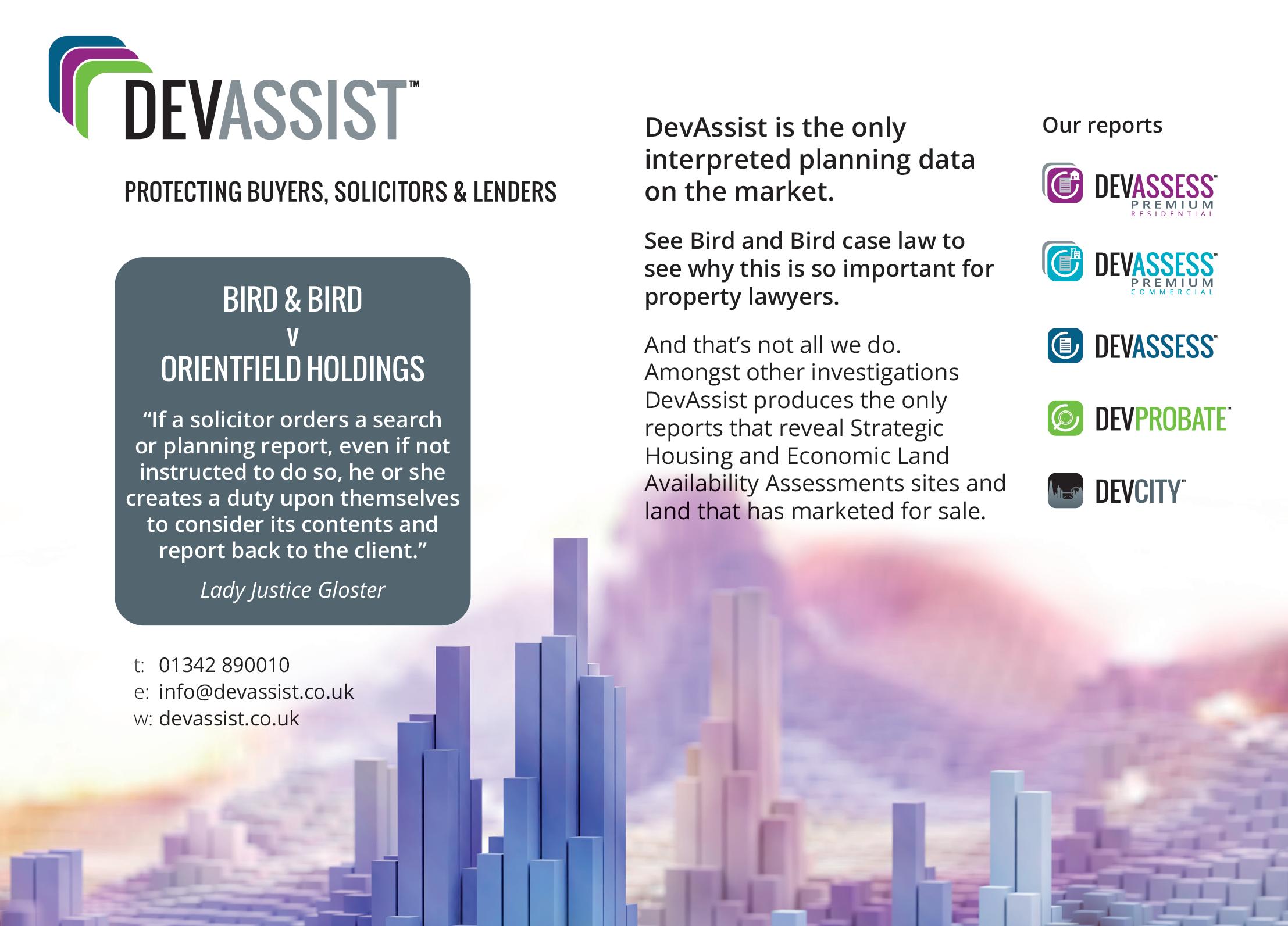


By David Renton
ISBN 978 1 91364 856 5
LEGAL ACTION GROUP
The access to justice charity www.lag.org.uk
ESSENTIAL READING FOR HOUSING PRACTITIONERS ACTING FOR CLIENTS FACED WITH REPOSSESSION
An appreciation by Elizabeth Robson Taylor MA of Richmond Green Chambers and Phillip Taylor MBE, Head of Chambers, Reviews Editor, “The Barrister” and Mediator
There is very little that strikes more terror in the souls of its victims than the threat of impending homelessness via the judicial processes involved, which culminate in the process of eviction.
There ought to be an erudite and readable le book about it – and there is, thanks to this very useful publication from the Legal Action Group (LAG), the access to justice charity, who are justly famed for producing legal texts accessible not only to lawyers, but to the average concerned reader. David Renton, the author, is a barrister who represents tenants and mortgage holders embroiled in possession hearings.
Published in handy paperback format, the book offers a broad and concise coverage of ‘the use of the principles of equality in housing law’ – and equally of prime importance – the duty of landlords to fulfil their duties under the general categories of fitness and repossession.
As the publishers point out, the book covers the often complex and controversial matters, for example, of council houses let by housing associations, as well as houses held in thrall either to mortgages, or long leases. It should be added that homeowners in mortgage arrears suffer the same anxieties as those who rent – hence the general and urgent need for all practitioners to be duly bound in support of clients who struggle with these and other difficulties in the housing sector.
Practitioners and clients alike coming to grips with these problems will find
this book especially helpful. As a concise work of reference, it truly excels. The precise introduction points directly to the subject of the book, namely the Equality Act of 2010 and its related principles –which apply both to business premises and residential properties.
Straightforward to navigate, the book has a detailed table of contents, enabling the reader – lawyer of not – to find the necessary advice they may be looking for, and for those doing further research, the book contains extensive footnotes, plus a detailed and useful index at the back.
Note too, the particular advantage of a 30-page section of precedents –including for example, the precedent entitled ‘Case Summary Application to Set Aside Possession Order.’ Also included in this concise text are Tables of Statutes, Statutory Instruments and also a Table of European and International Legislation.
For practitioners and clients alike, this book emerges as a practical and indispensable purchase.
The date of publication of this paperback book is cited as 2024.
A guide for decision-makers on acting within the law
By: Victoria Butler-Cole KC and Steve Broach KC
ISBN 978 1 91364 862 6
LEGAL ACTION GROUP
The access to justice charity www.lag.org.uk
LAWYER OR NOT, A DECISION MAKER NEEDS TO
An appreciation by Elizabeth Robson Taylor MA of Richmond Green Chambers and Phillip Taylor MBE, Head of Chambers, Reviews Editor, “The Barrister” and Mediator
If you have found yourself – or your client – in the position of being appointed as a decision-maker over a number of issues in either the public or private sectors, you need this book, recently published by the Legal Action Group (LAG), the access to justice charity, who are
justly famed for producing legal texts accessible not only to lawyers, but to the average concerned reader.
Pertinent, applicable and directly accessible to lawyers and non-lawyers alike, this book emerges as an essential guide – no doubt about that – to both the basics and the possible and probable complexities which, more often than not, are likely to emerge in the decision-making process.
With depth and clarity, a wide range of issues are discussed, with a focus on the most controversial, including for example, cases pertaining to equality and human rights. The book therefore covers a lot of ground in explaining an extensive and complex subject, with the thoroughness and clarity that makes it accessible to all decision-makers –lawyers and non-lawyers alike.
As the LAG explains, the book’s overall aim is to ensure that “a decision-making process follows a lawful process.” And that includes, appropriately, answers to the problems of those who are aggrieved by a decision and therefore considering a complaint, or a legal challenge.
The first chapter to turn to is the ‘Checklist’ and an invaluable checklist it is. Certainly, it covers such necessities as powers, problems, evidence and much, much more, including what to do if your decision is challenged – a challenge indeed.
Certainly, this compact volume provides a treasure trove of useful resources for further research. Note the almost twenty pages of Tables of Cases plus the Table of Statutes and Statutory Instruments - and a Table of European and International Instruments. Also note the handy index, the glossary of legal terms and the extensive footnotes –indispensable if more detailed research is required – and it usually is, in so many circumstances.
“A guide for decision makers on acting within the law” is the book’s subtitle and an excellent guide it is. Any lawyer advising clients embroiled in these or similar problems should very quickly acquire a copy.
The date of publication of this paperback book is cited as July 2024.

Business valuations in shareholder disputes and matrimonial cases often highlight undisclosed cash takings and personal expenditure hidden in company accounts. It can also be relevant when considering the valuation of a company for strategic planning or a business sale.
When dealing with disputes, including divorces, it is not uncommon for one party to raise concerns about undisclosed cash or personal expenditure and the impact they have on the valuation. At the same time, the other party may dispute the existence, extent or relevance of the transactions.
Historically, cash-based industries provided an opportunity to not record all takings and to either spend the cash personally or bank it in a private account. The move to a cashless economy has made it more difficult to divert cash income in this way. However, we do come across situations where certain types of business sales are omitted completely from the records and the sales receipts are diverted to a private bank account.
Quantifying undisclosed cash takings is difficult unless the parties are willing to provide an estimate that we can use in our calculations. In some industries, we may be able to estimate a figure based on, for example, diary entries or bookings. Clearly if the undisclosed takings are banked in a private account, we can use statements from those accounts to quantify the amount omitted from the accounts.
We have had cases where both parties are fully aware of a long-term
practice of undisclosed sales and it only becomes an issue at the time of the divorce. We also need to consider the implications in respect of underpaid tax, VAT and penalties.
In terms of the impact on valuation, it depends on valuation basis in our instructions. If instructed to provide an “open market valuation”, we may decide not to include undisclosed takings in the valuation calculation. This may be because, in our view, the undisclosed takings cannot be reliably estimated or because an external buyer will not be prepared to pay for profits that are not recorded in the accounts. An external buyer may in fact discount the valuation due to the potential tax issue.
Alternatively, if instructed to provide an “equitable basis” valuation, we may decide to include the undisclosed income to arrive at a fairer outcome where one party is going to retain the company and future undisclosed profits. In a divorce case, undisclosed takings may also be relevant in assessing future sustainable income if it is expected the undisclosed takings will continue.
In family companies it is common for personal or discretionary expenses to be paid through the company. In the first instance the valuer needs to ascertain if the expenditure has been charged to a director’s loan account or whether it is charged within the profit and loss account.
If expenditure is charged to a director’s loan account, then there is no impact on the valuation of the business. In effect
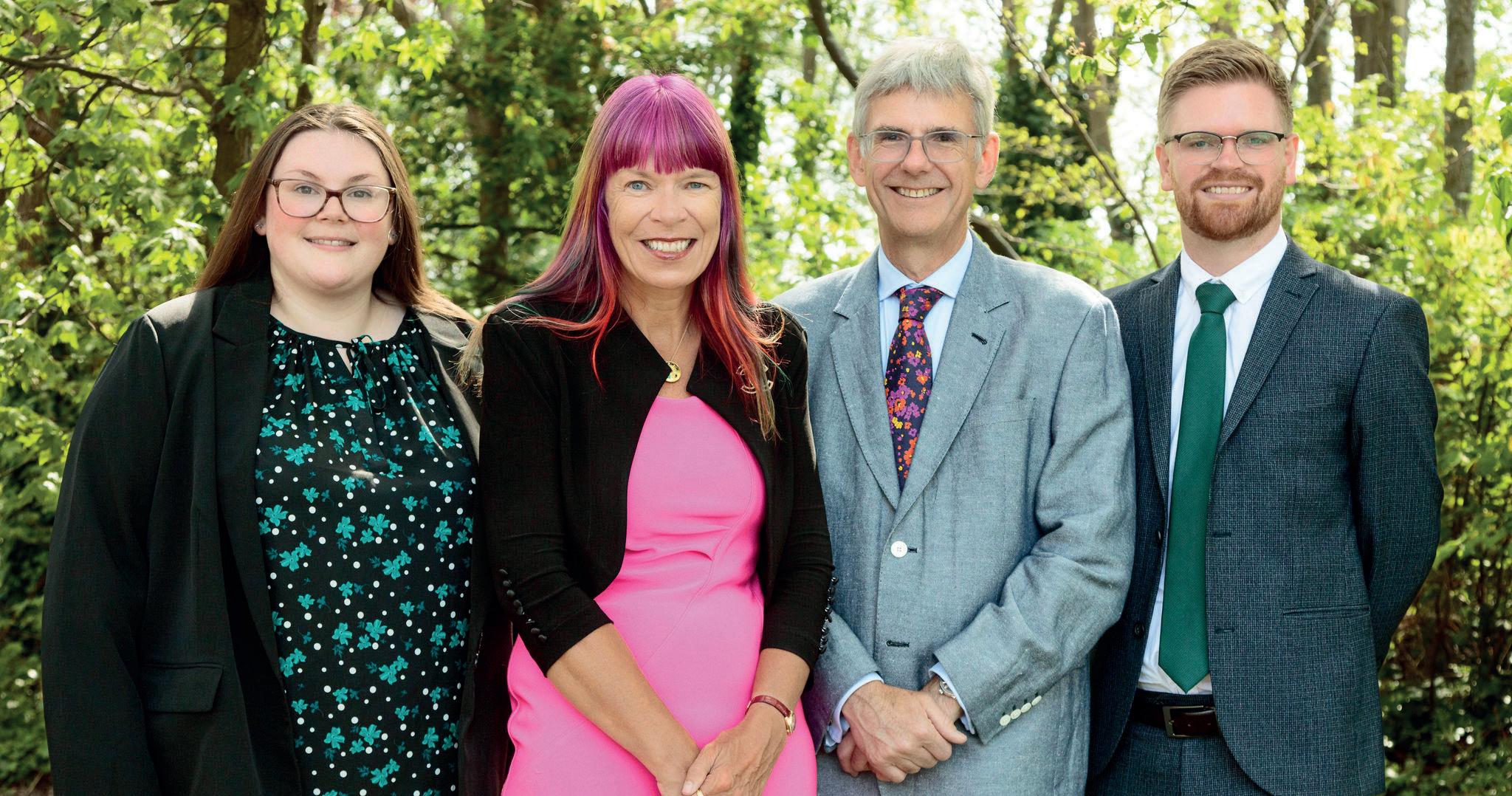
a cash balance is replaced by a debt in the company. It may be an adjustment if the directors is unable to repay an overdrawn loan.
The expert may be instructed to investigate the level of private expenditure in the accounts or it may be identified through analysing the profit and loss variances. However, it can be difficult to identify, particularly if hidden in the “cost of sales” heading.
If the expenditure is in the profit and loss account and can be quantified, there is likely to be an impact on valuation –potentially significant. For example, let’s assume that the personal expenditure in the profit and loss is £100,000 annually. A value based on future maintainable earnings/EBITDA and a multiplier will increase: if we adopt a multiple of, say, 5X, then the valuation in this case increases by £500,000.
Again, in divorce cases, personal expenditure within the profit and loss account will impact the assessment of future sustainable income as well as valuation.
Personal expenditure within the profit and loss account may also raise potential issues in terms of potential future tax liabilities.
In commercial valuations for a potential sale of the business, the seller will provide an estimate of personal and discretionary expenses which a buyer is unlikely to continue paying. They will seek to add these back in the assessment of the company’s market value. Such adjustments typically include family wages and other benefits to directors which exceed an assessment of the commercial salary for the role.
Undisclosed takings and personal expenditure are typically sensitive issues but can have a significant impact on a business valuation. If instructing an expert, it is helpful to engage early with the expert and to provide clear instructions on how the issue is to be dealt with. Valuations can be prepared based on alternative assumptions.


